25 Best ChatGPT Prompts for Writing (Free Prompt Templates)

Are you struggling to find the best ChatGPT prompts for writing? I get it. As a writer myself, it’s taken me a lot of experimentation to figure out the best ways to use ChatGPT prompts for writers (in a way that still keeps me at the center of my content).
Whether you’re looking to improve something you’ve already written or you’re creating a piece of content, email, or even writing fiction, ChatGPT can be an incredible tool to use.
If you find writing stressful, time-consuming, or tedious then the rise of ChatGPT and its alternatives is fantastic news. Whatever kind of writing you’re doing—from blog posts to marketing emails, social media content to short stories—AI writers can help.
But here at RightBlogger, we know ChatGPT prompts aren’t as easy as they look. Too many writers put in something very general like “Write a blog post about blogging mistakes” … and they inevitably get disappointing results.
Think of ChatGPT (or your AI tool of choice like Gemini or Grok) as a keen young intern. If you gave an intern vague or unclear instructions, you wouldn’t expect a great result. The same goes for AI.
Whether you’re a blogger, freelance content writer, copywriter, or you’ve got a secret dream to write a novel, AI can help.
Here are my favorite writing prompts to use … and some extra tips on getting the most of ChatGPT.
25 Best ChatGPT Prompts for Writing (Free Prompt Templates)
I’ve split this list into different types of ChatGPT writing prompts, so you can jump straight down to the ones that are most relevant to where you’re at right now:
- ChatGPT Writing Prompts for Bloggers and Content Writers
- ChatGPT Prompts for Marketing
- ChatGPT Prompts for Copywriters
- ChatGPT Prompts for Fiction Writers
👋 Important Tip: Feel free to personalize and add more details to the prompts, especially in the “fill in the blanks” sections. Don’t leave ChatGPT guessing! The more specific your instructions are, the better your results will be. Highly detailed prompting, behind the scenes, is part of what makes RightBlogger so powerful.
Create Automated SEO Blog Posts in Minutes with RightBlogger
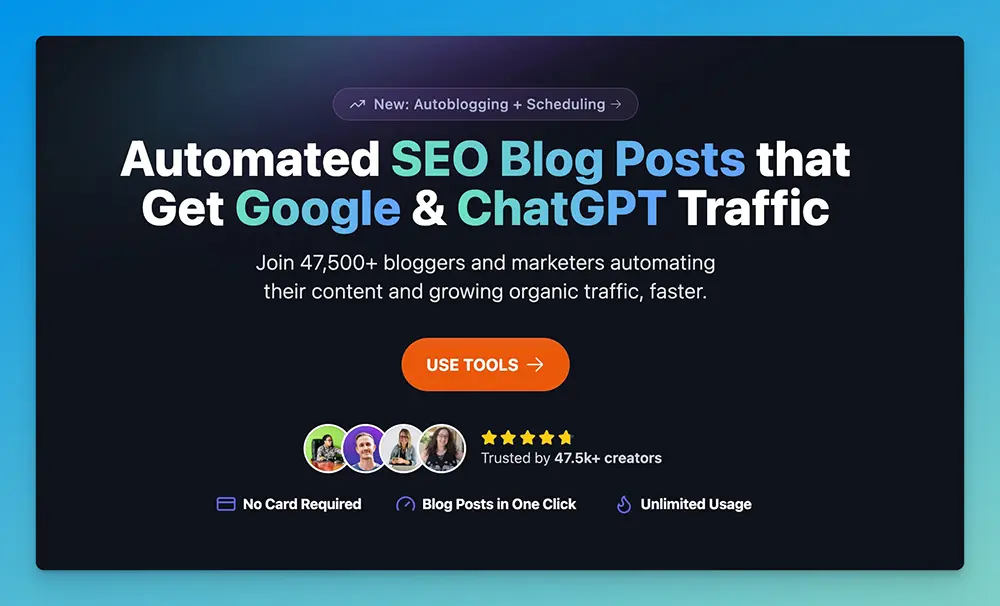
Join 47,587+ bloggers, creators, marketers, writers, & business owners in using RightBlogger’s powerful autoblogging tools. You’ll unlock 80+ blogging, SEO, and marketing AI tools to create content faster & more effectively today. Plus, you’ll access our library of courses, a private community, Tool Studio’s AI lead magnet builder, and more.
ChatGPT Writing Prompts for Bloggers and Content Writers
Creating content? Whether you’re writing for your own blog or for a client’s site, these prompts can help you produce top-quality content faster than ever before.
1. Blog Post Ideas (in Seconds)
Use this prompt to come up with a list of great ideas (with strong SEO potential) in just seconds. If some of the ideas aren’t a great fit for your blog, just ask for “20 more ideas using the same format.”
Here’s that prompt in action, for the topic “time management”:

Try our Blog Post Idea Generator tool inside RightBlogger.
2. Keyword Research
Getting a list of seemingly awesome blog post ideas in seconds is great and all, but what if nobody wants to read, watch, or listen to your content about those topics?
That’s where strategic keyword research comes into play. Keyword research helps you validate whether a particular topic does indeed have some online demand—which is essential if you’re hoping to drive traffic to your website from search engines like Google.
Because keyword research is a relatively nuanced process that can take a while to fully wrap your head around when you’re new to the content game, we made an easy-to-use Keyword Research Tool inside RightBlogger that helps you stay focused on what matters most… identifying less competitive keywords you have a realistic shot at ranking for, within your niche:
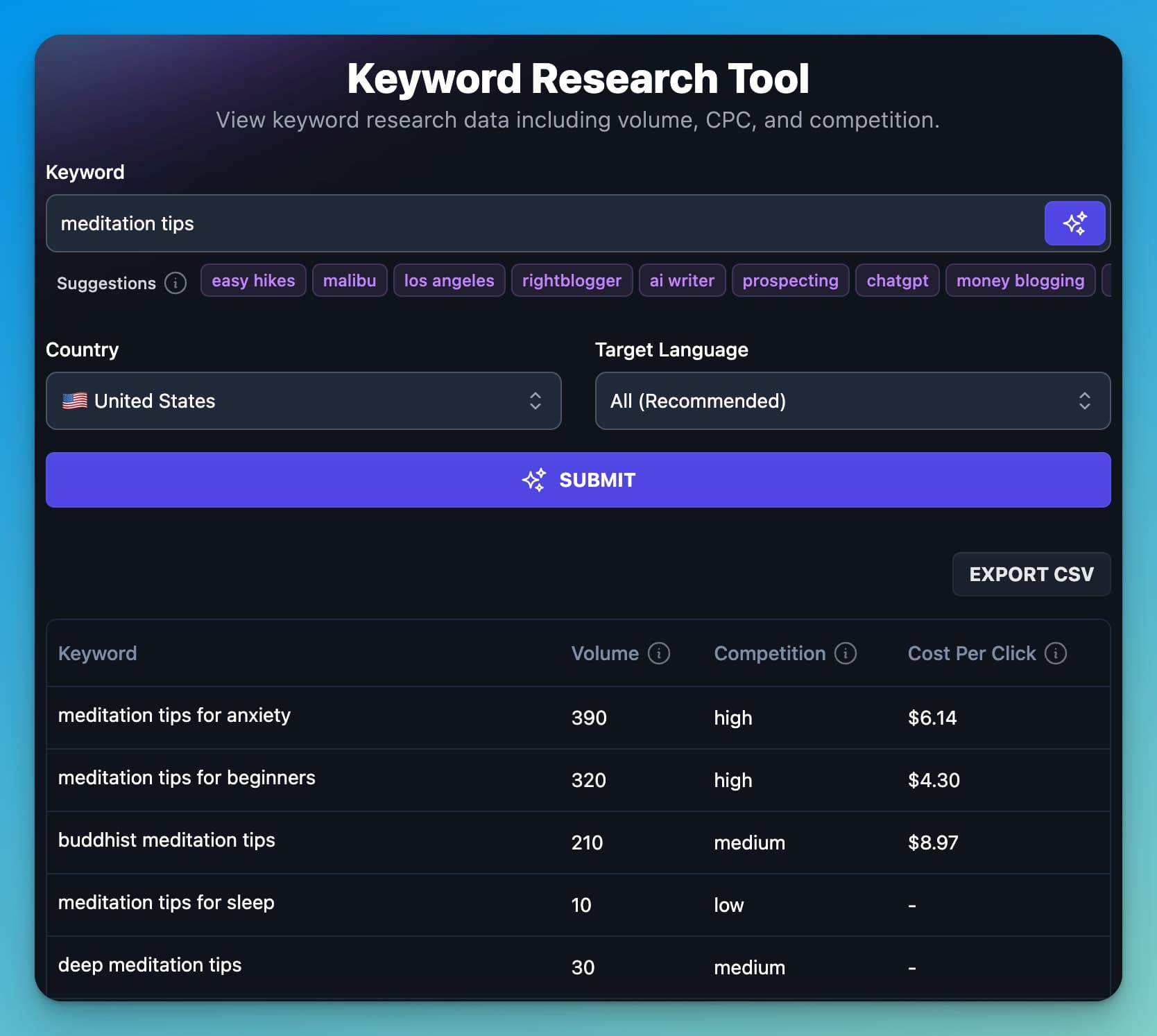
If you’d rather go the route of doing your keyword research in ChatGPT, snag this prompt I’ve tinkered with and honed, to give you just the right amount of information you need to be helpful and not overwhelming:
Here’s this keyword research ChatGPT prompt in action:
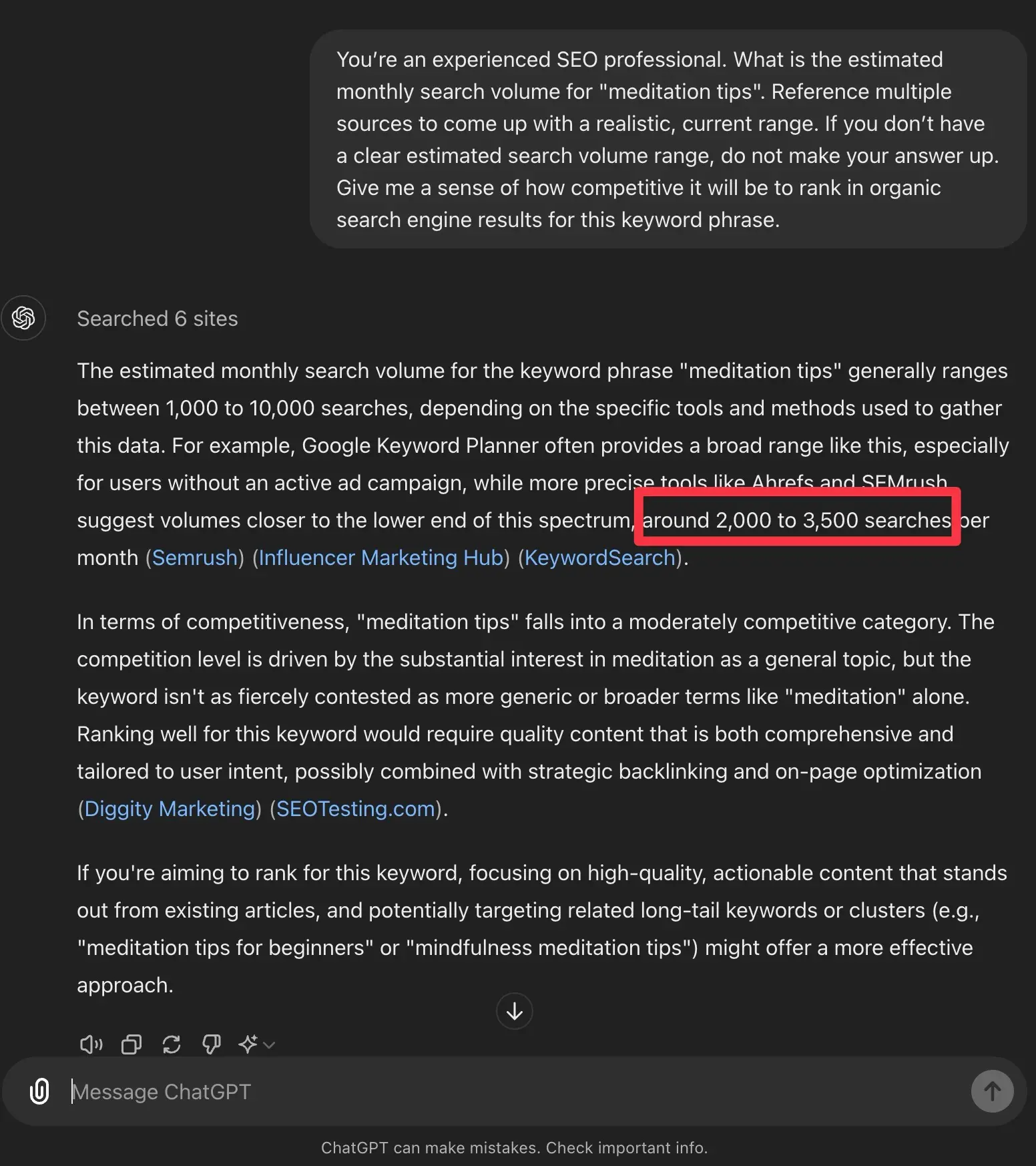
If you haven’t yet, be sure to try our supercharged Keyword Research Tool—I think you’re gonna love it.
3. Blog Post Introductions that Hook Readers
An effective introduction grabs the reader’s attention and sets the stage for the entire article… but so many bloggers get stuck trying to write that introduction.
Ideally, your introduction will address the reader’s pain points, showing them that you understand their needs and why they’re here.
Here’s a prompt you can use for writing a great blog post introduction:
Here’s this ChatGPT writing prompt in action, creating an introduction for a beginner’s guide to meditation pointers I’m working on:
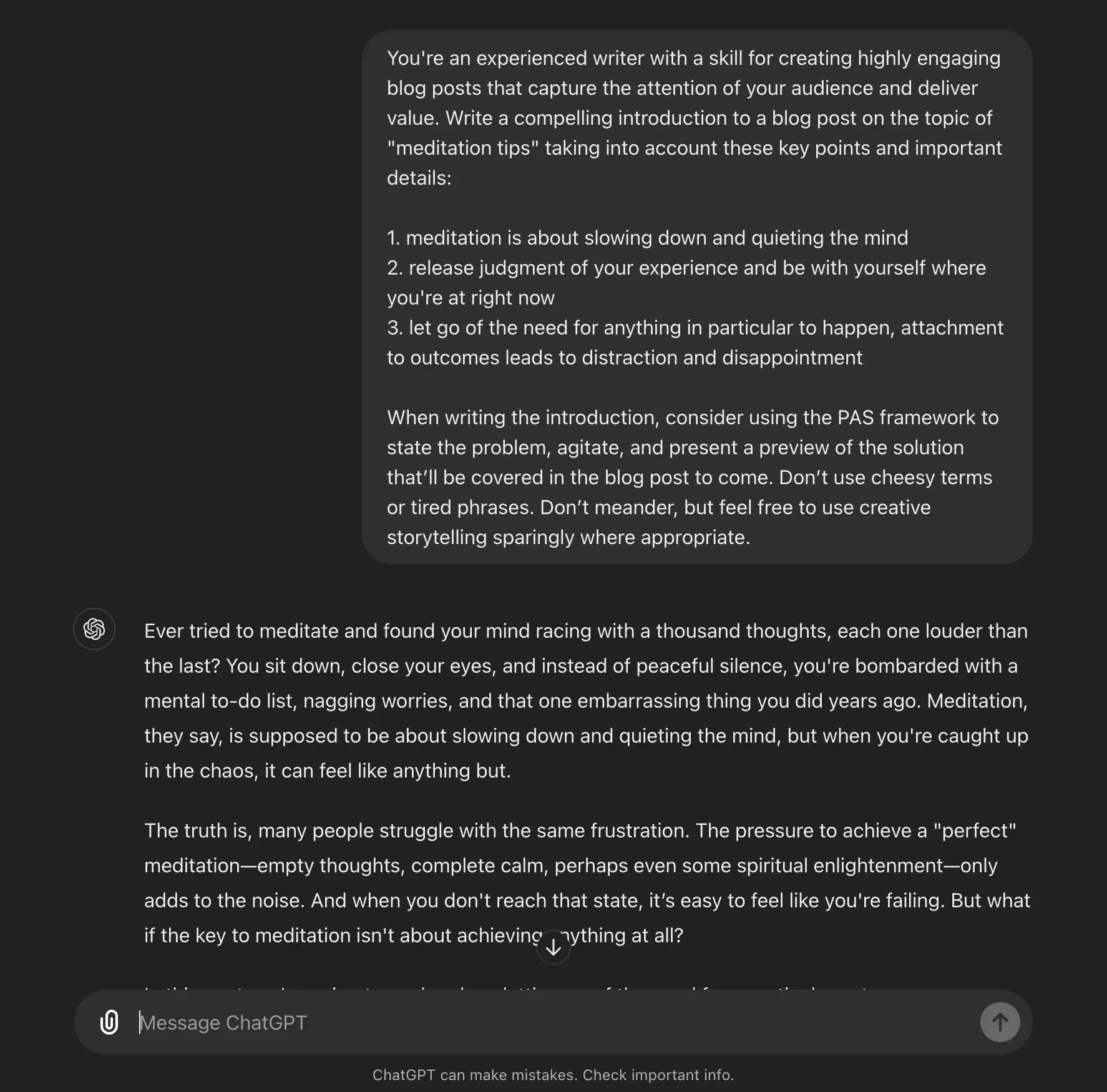
Check out our Post Introduction tool inside RightBlogger.
4. Outline a Blog Post
For years, I’ve been teaching my blog outlining process that’s helped me consistently generate over 500,000 monthly readers to my blog.
It works because it’s simple & it’s grounded in understanding exactly what your readers are seeking, when they land on your content. This ChatGPT prompt for writing a blog outline incorporates my process:
Here’s this blog outline ChatGPT prompt in action:
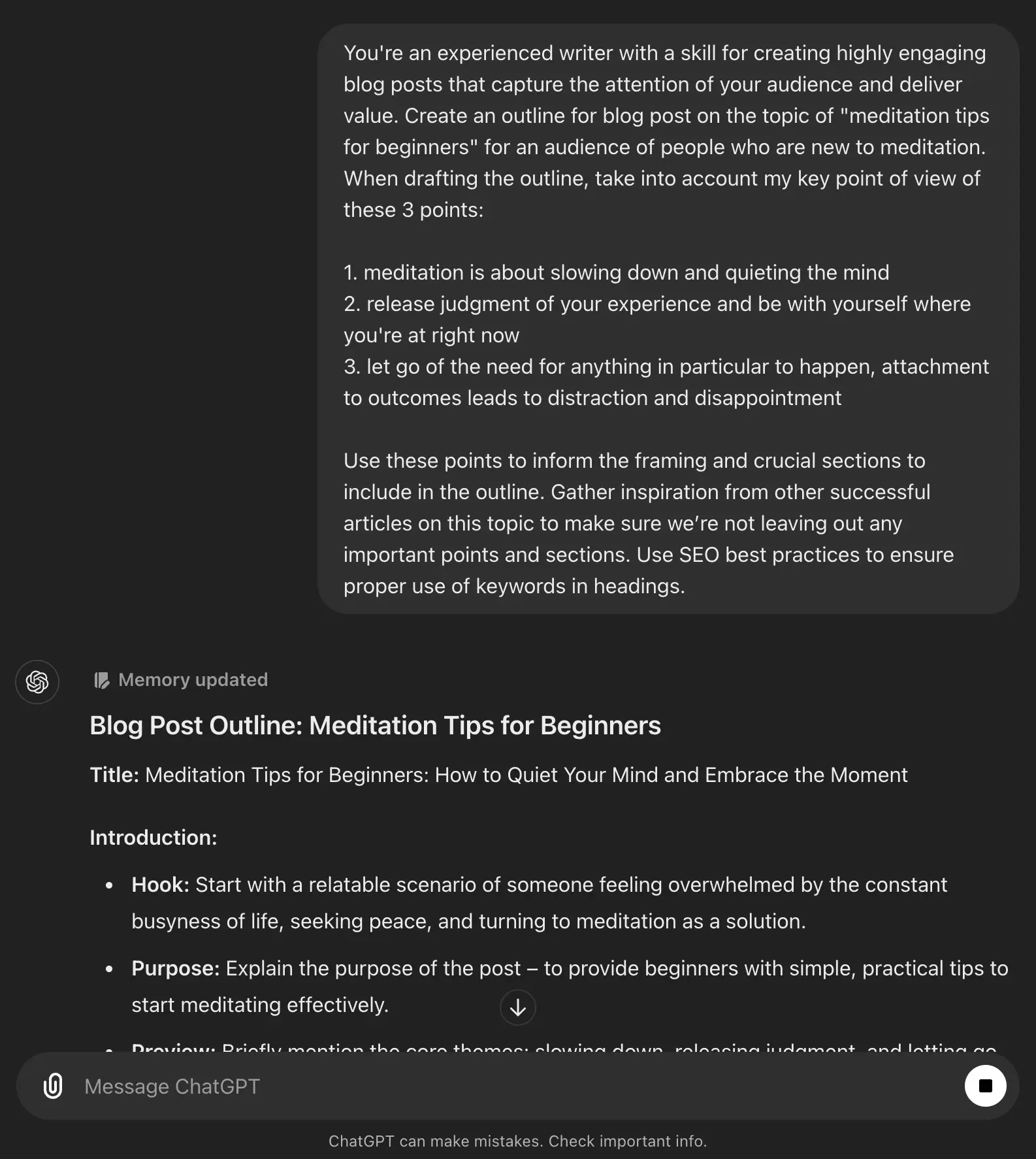
Make this easier by taking our Blog Outline Generator for a spin today.
5. Blog Post Sections
Writing entire blog posts using ChatGPT (if you don’t use extensive, highly detailed prompts) can be a bit of a gamble with two potential outcomes:
- You get lucky and it writes a first draft that’s workable for your purposes
- You get something that sends you into hardcore editing (rewriting) mode for hours if you decide to use it at all
For that reason, sometimes it pays to write your blog posts using ChatGPT in smaller, more digestible sections that you can then string together into a more comprehensive article during the editing process. Here’s my ChatGPT writing prompt for crafting sections of blog posts, so I have more control in the process:
And here’s this ChatGPT prompt for writing blog sections, in action right here:
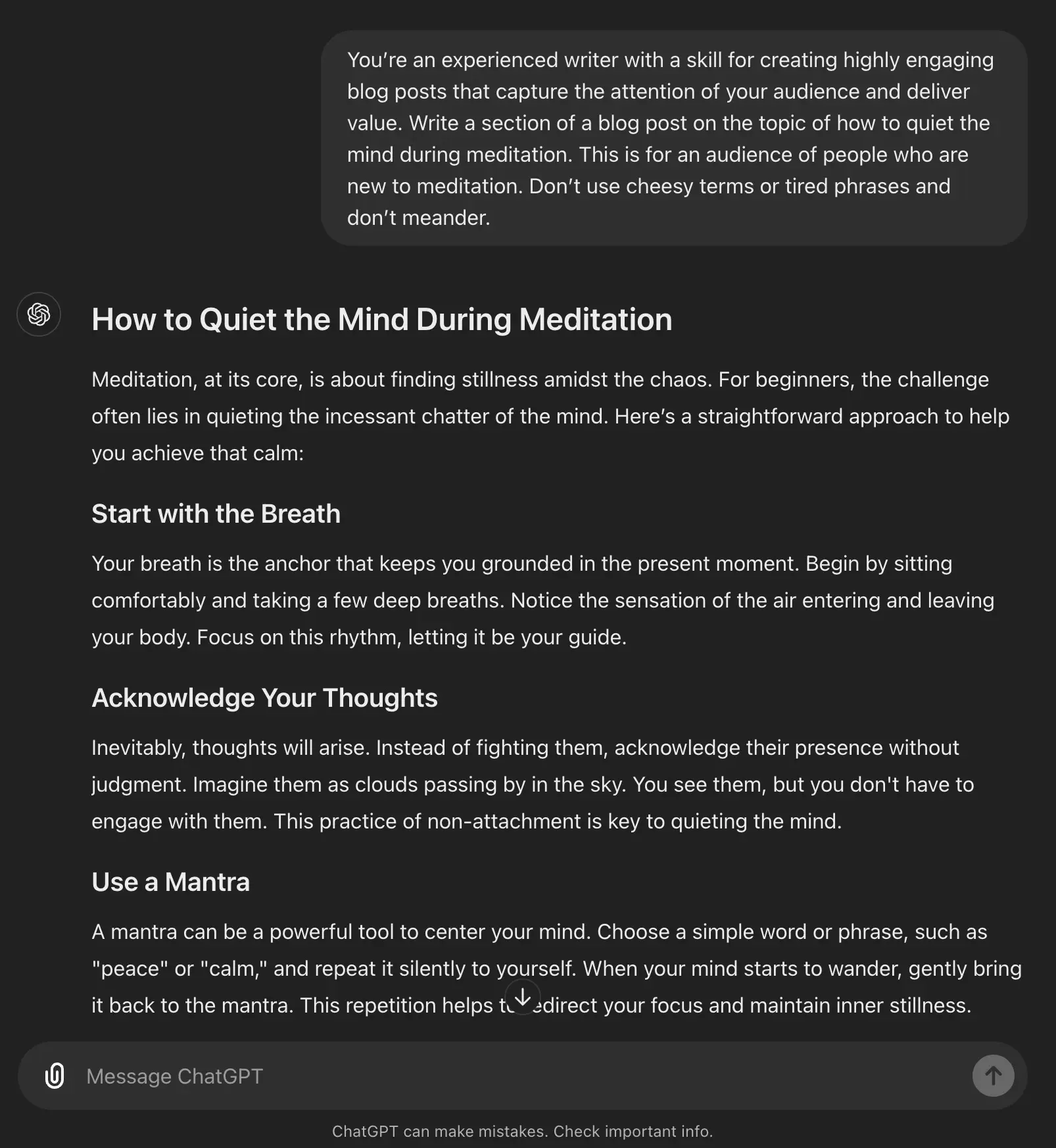
Write your content in chunks & sections using our Paragraph Generator tool.
6. Write a Blog Post (Long-Form & SEO-Optimized)
I’ll be the first to tell you that ChatGPT (and AI in general) isn’t best-utilized to write entire blog posts from start to finish without weaving a lot of your own guidance into the process. Without you, your AI-generated blog post is guaranteed to sound generic and boring.
That’s why we built an entire tool inside of RightBlogger (the Article Writer) with a tooooon of complex details that work behind-the-scenes to incorporate your take and a whole lot of other elements, directly into the creation process. Add your personalized MyTone and these first drafts are always workable to get across the content finish line:
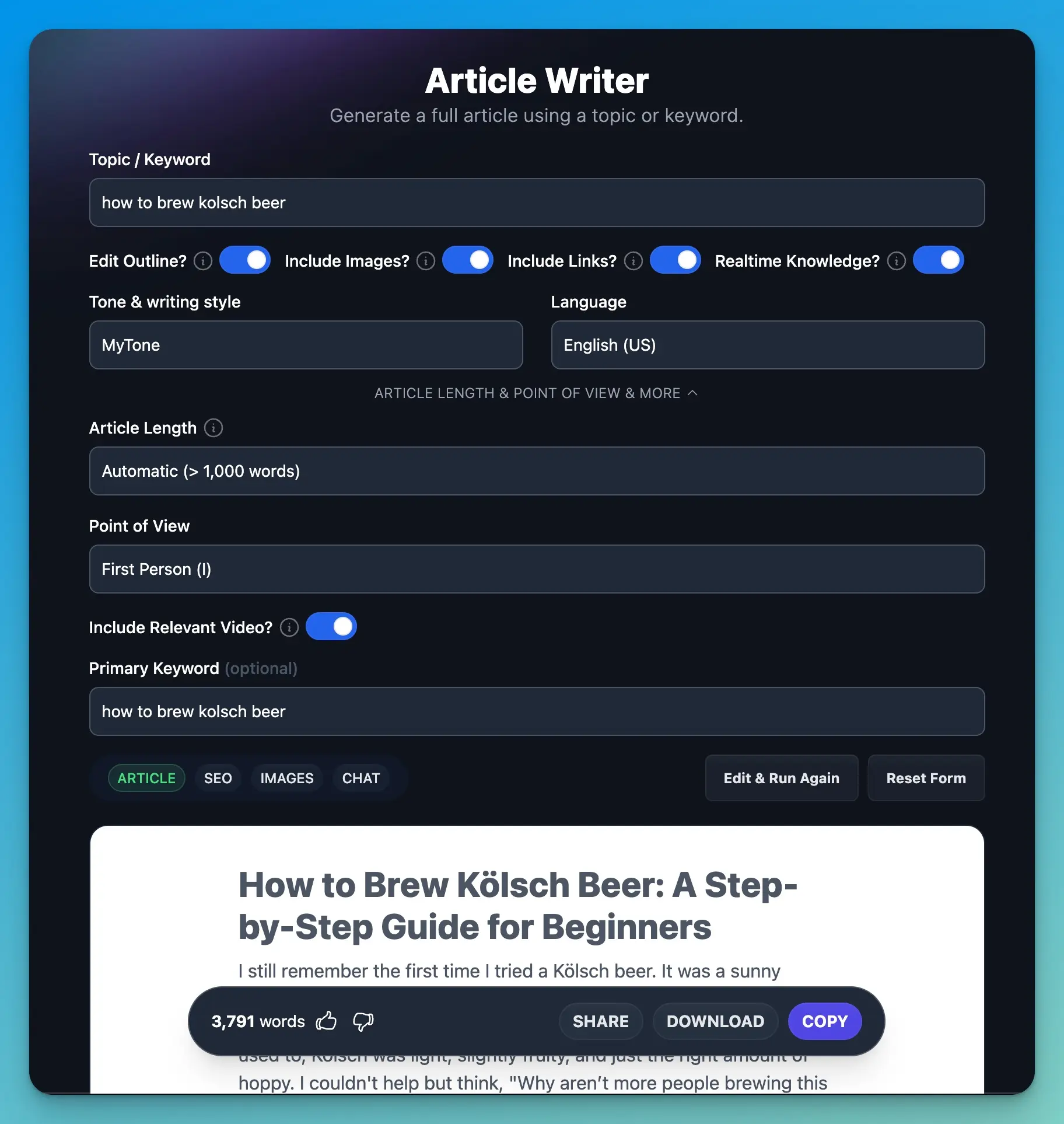
However, if you do invest the time to really inject yourself into this first draft writing process, ChatGPT can actually produce pretty great starter blog post drafts to get you pointed in the right direction. This is my favorite ChatGPT prompt for writing SEO-friendly blog posts that can snag the attention of readers & rank well in search engines, too.
Here’s this prompt in the real world, inside ChatGPT:
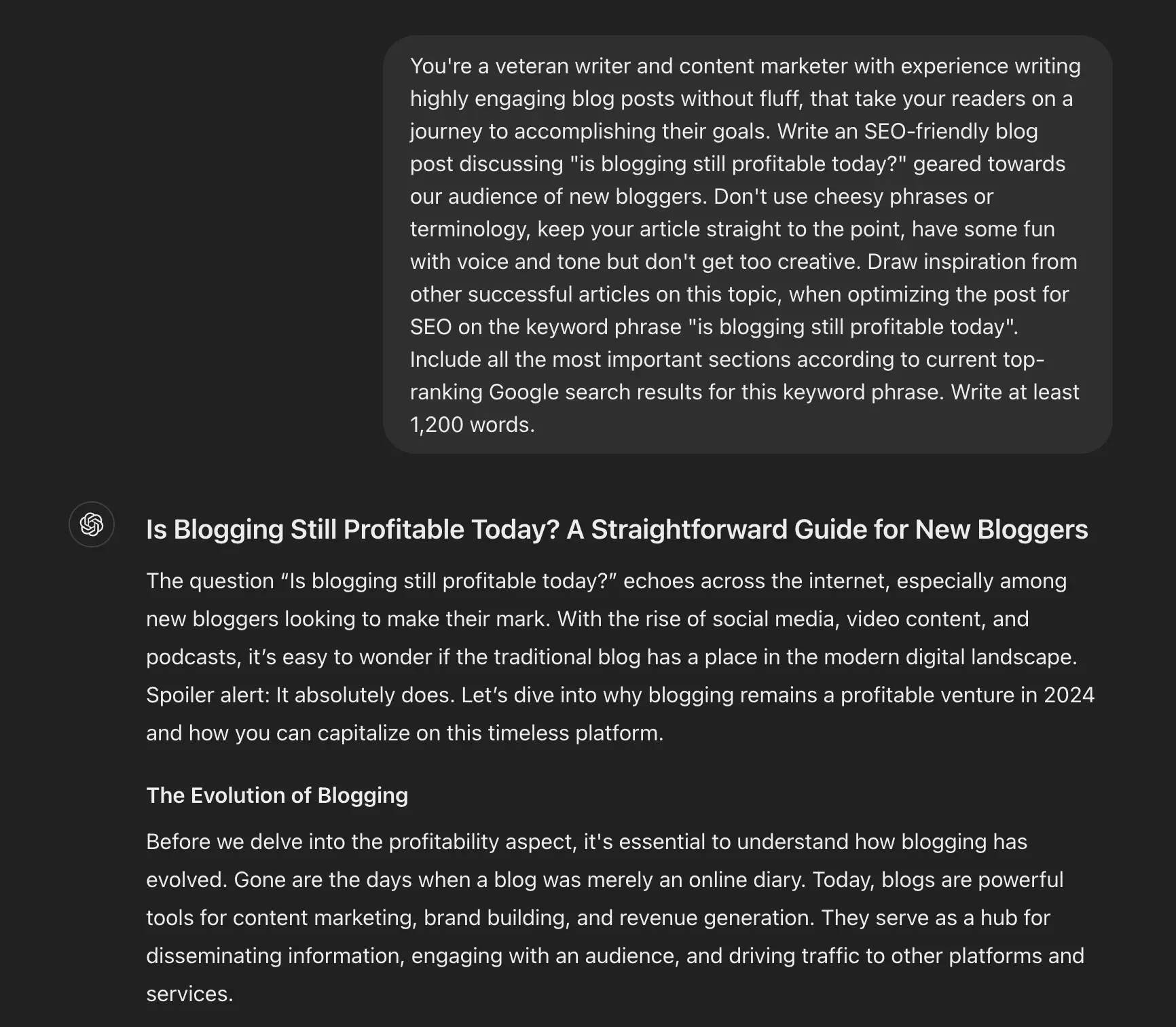
Check out our flagship Article Writer tool inside RightBlogger.
7. Action-Oriented Blog Conclusions
Every effective blog conclusion achieves one thing in common—it successfully invites readers to take further action, after reading your content. So clearly, it pays big time to think through which action you want your most engaged audience members to take.
Download an eBook? Pick up a free template? Sign up for your email list?
There’s no real wrong call-to-action to include in your blog’s conclusion, as long as it’s (1) relevant to the content at-hand and (2) provides additional value to your readers. This ChatGPT writing prompt for conclusions works wonders:
Here’s this ChatGPT prompt for writing a conclusion that encourages your readers to take action, in practice with my meditation guide example:
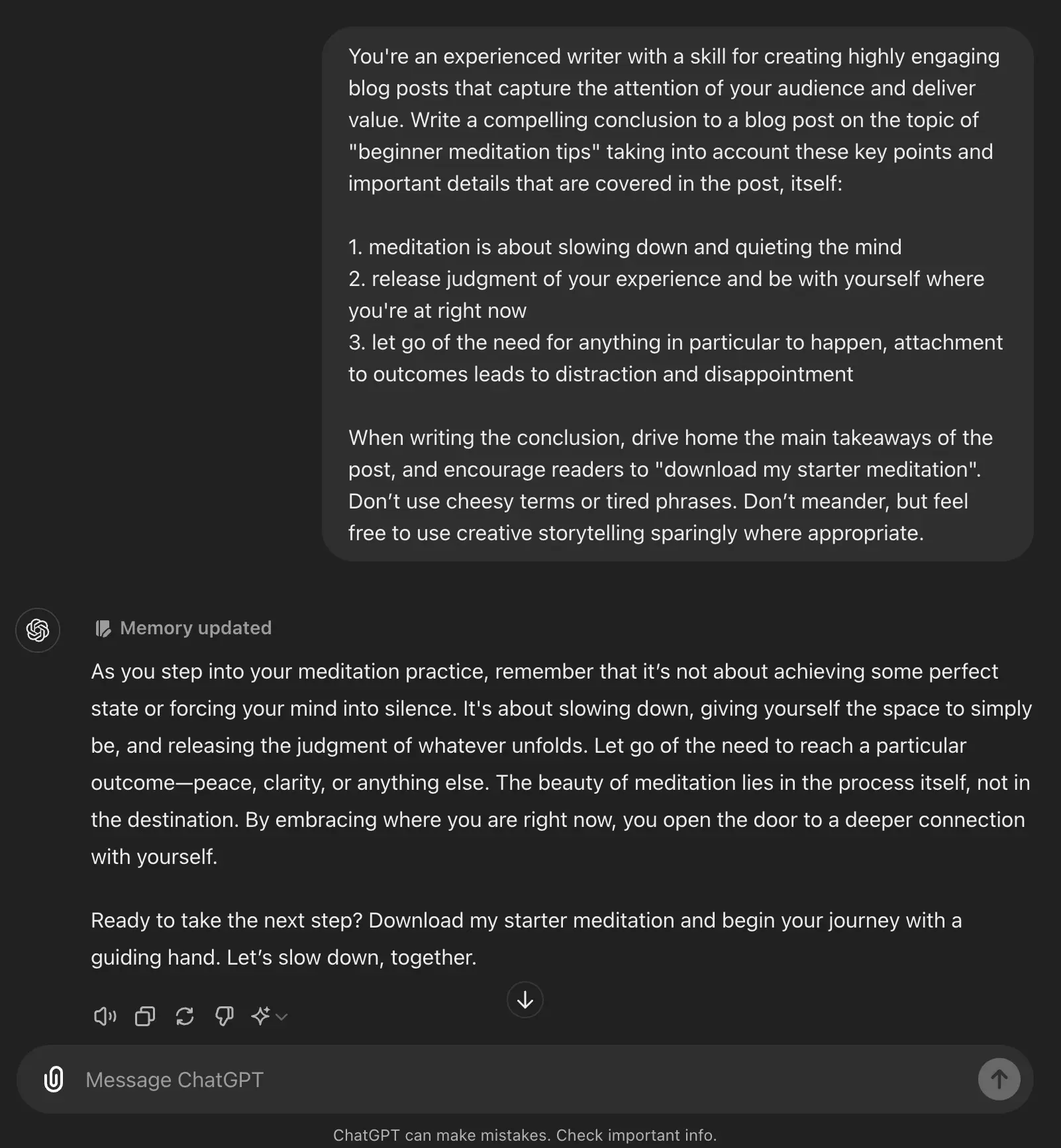
Check out our Blog Post Conclusion Tool with a free RightBlogger account today.
8. Content Publishing Schedule (Planning)
At the foundation of any ROI-positive content plan, is a research-backed publishing schedule that specifies exactly when you’re going to publish each piece of content that’s in your pipeline.
Whether you’re a solo content operation, or collaborating with a team of other creators & marketers, a publishing schedule helps keep everyone (including yourself) accountable for the deliverables that lead up to publish date. Here’s my ChatGPT prompt for creating a content publishing schedule, with some great ideas added into the mix:
And here’s this ChatGPT prompt doing it’s thang, in action:
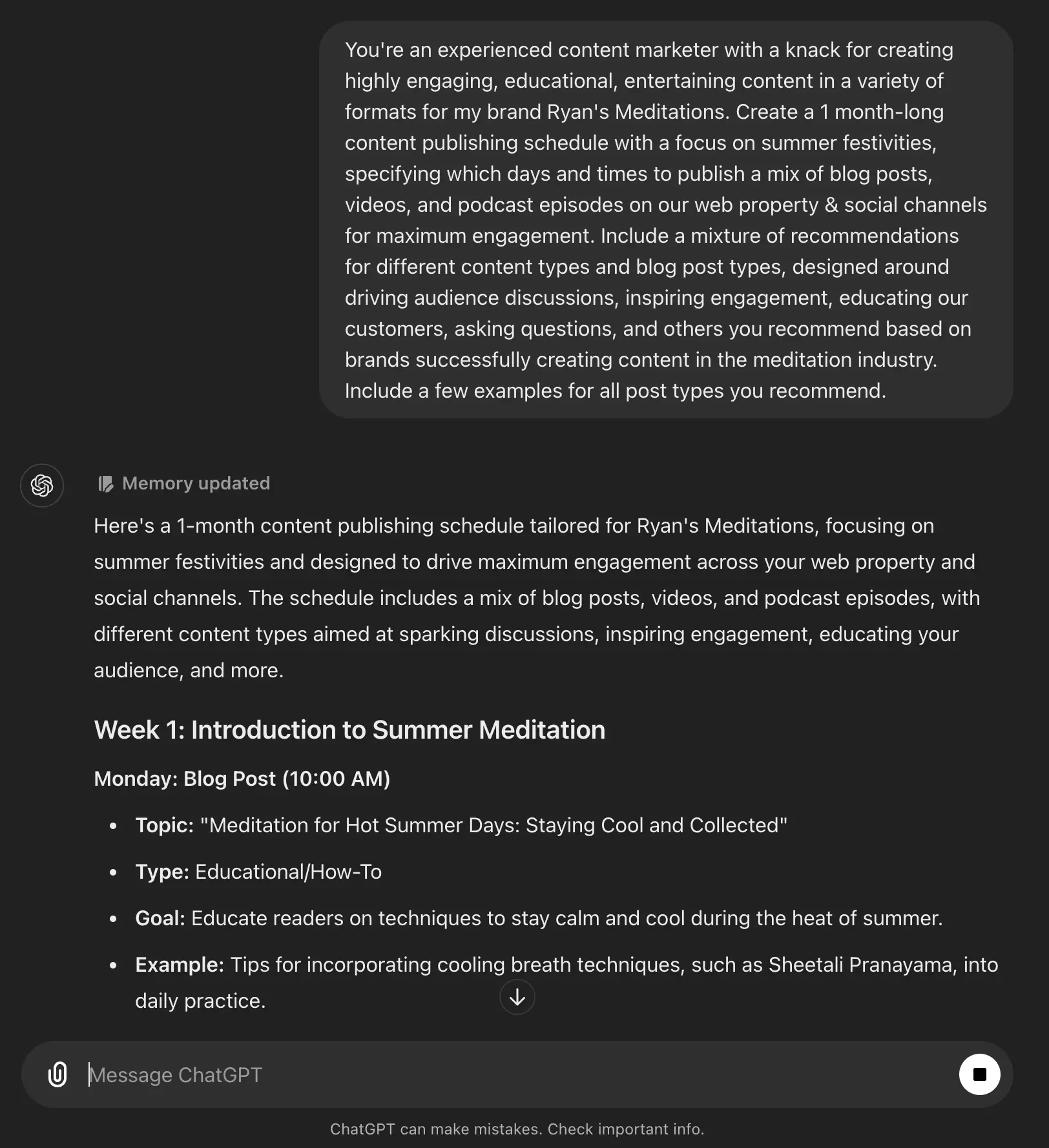
9. Keyword Cluster
A keyword cluster (also called a topic map or cluster map), is a way of organizing a list of all the most relevant topics & keywords you should create content about, in order to capture more organic traffic and send a positive signal to search engines like Google, that your website is an authoritative, comprehensive resource within your niche.
You always want to start by mapping out your keyword clusters during the brainstorming & planning stages of your content production process. This’ll serve as a great jumping off point for landing on a ranked list of upcoming topics your audience (or future readers) actually want to read about. Here’s my ChatGPT prompt for keyword clustering:
Here’s this keyword cluster prompt in action inside ChatGPT:
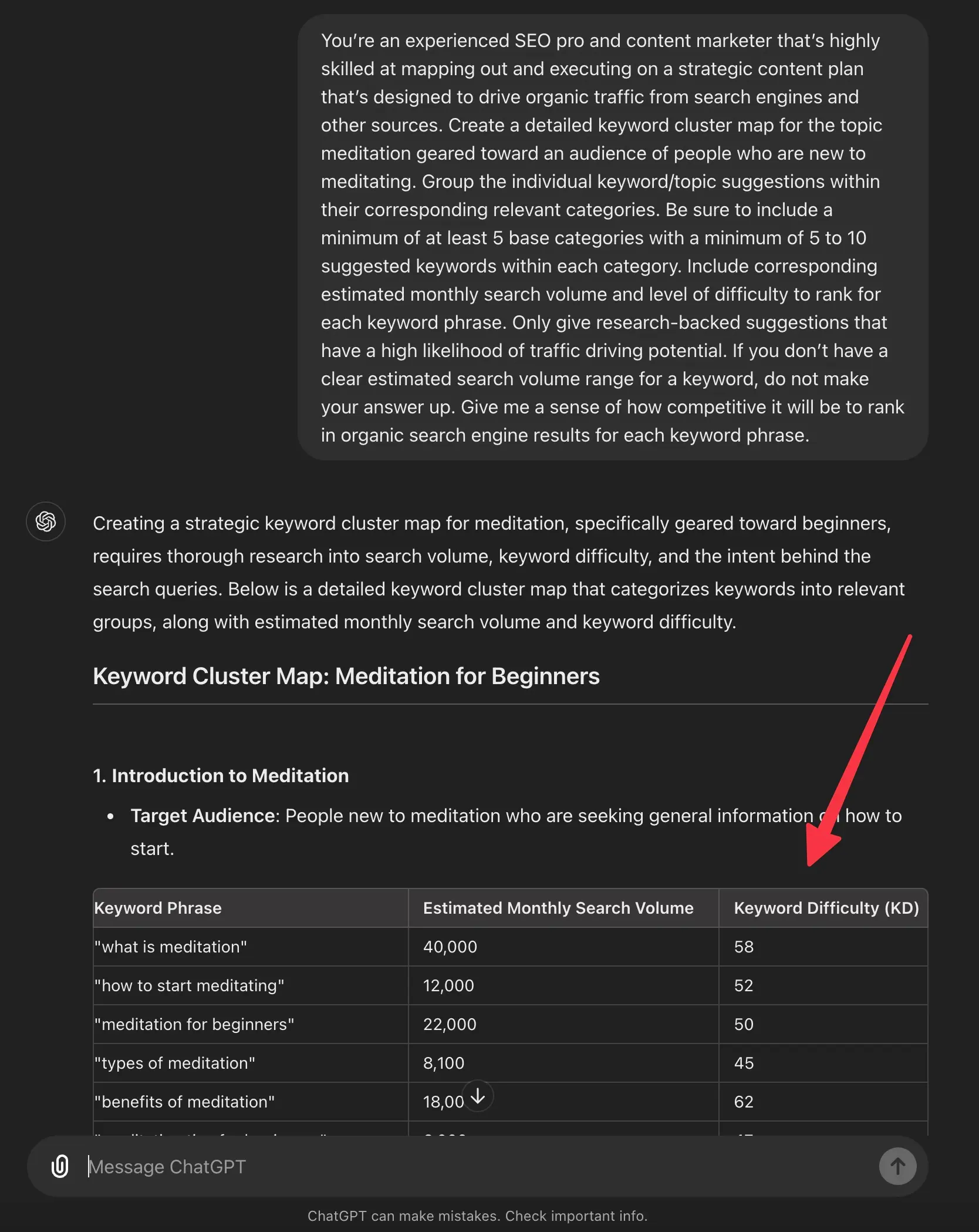
If you’re serious about getting SEO traffic, you’ll wanna take our advanced Keyword Cluster tool for a spin today.
10. People Also Ask (Long-Tail Keywords)
Google’s People Also Ask section near the top of most search results, is a literal goldmine for long-tail keyword ideas (with less competition to rank for) that your target audience is actively searching for answers & solutions about:
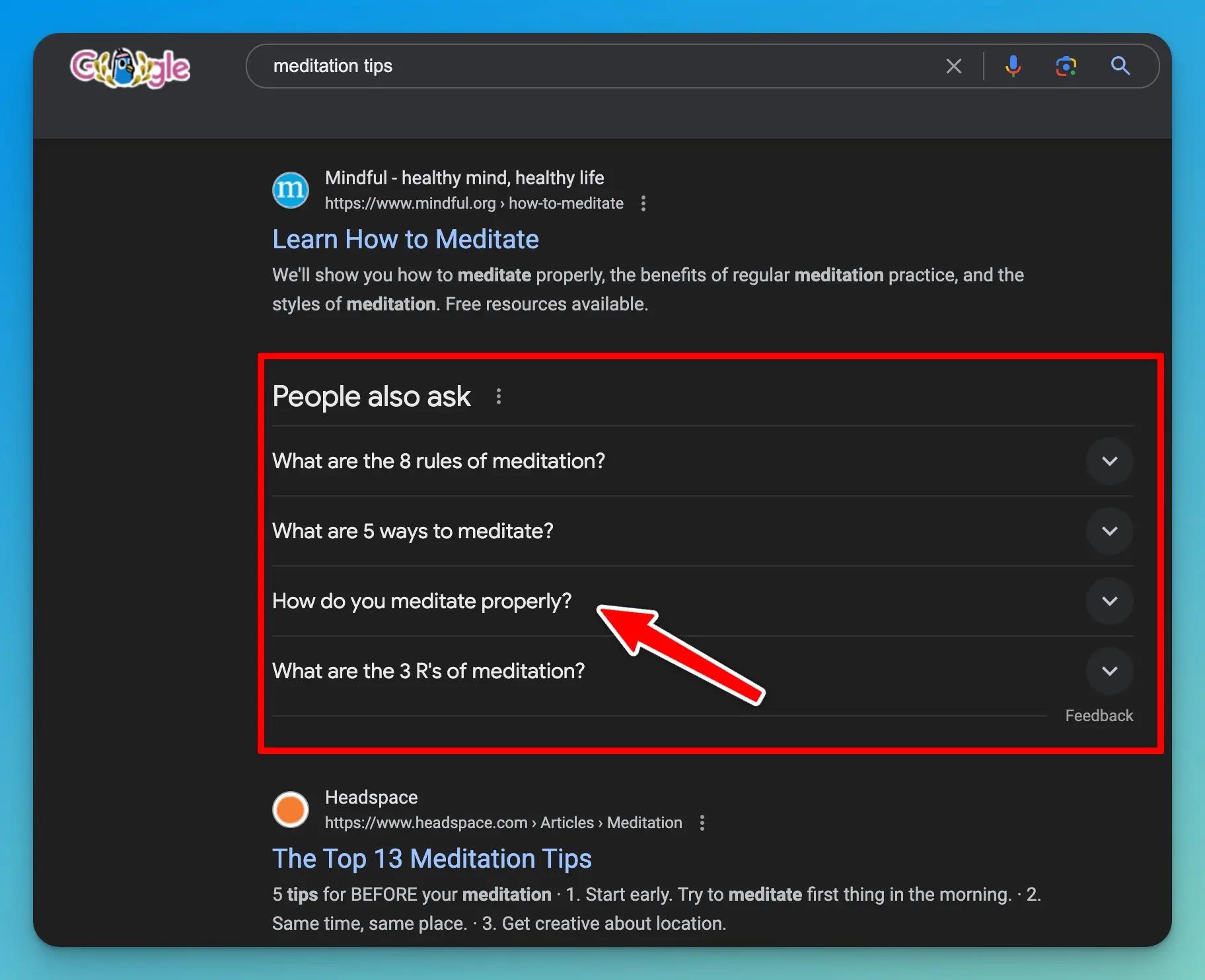
But doing a manual Google search, checking the results, copying & pasting the queries you like into a spreadsheet is a pretty lame process, if I’m being honest. Use tools like ChatGPT or our very own People Also Ask tool, to quickly generate and save all your PAA research.
Here’s my ChatGPT prompt for quickly identifying all the most relevant People Also Ask queries for any topic you’re considering creating content about:
Here’s this People Also Ask ChatGPT prompt in action, throwing out some really rich, useful data and guidance for your content creation process:
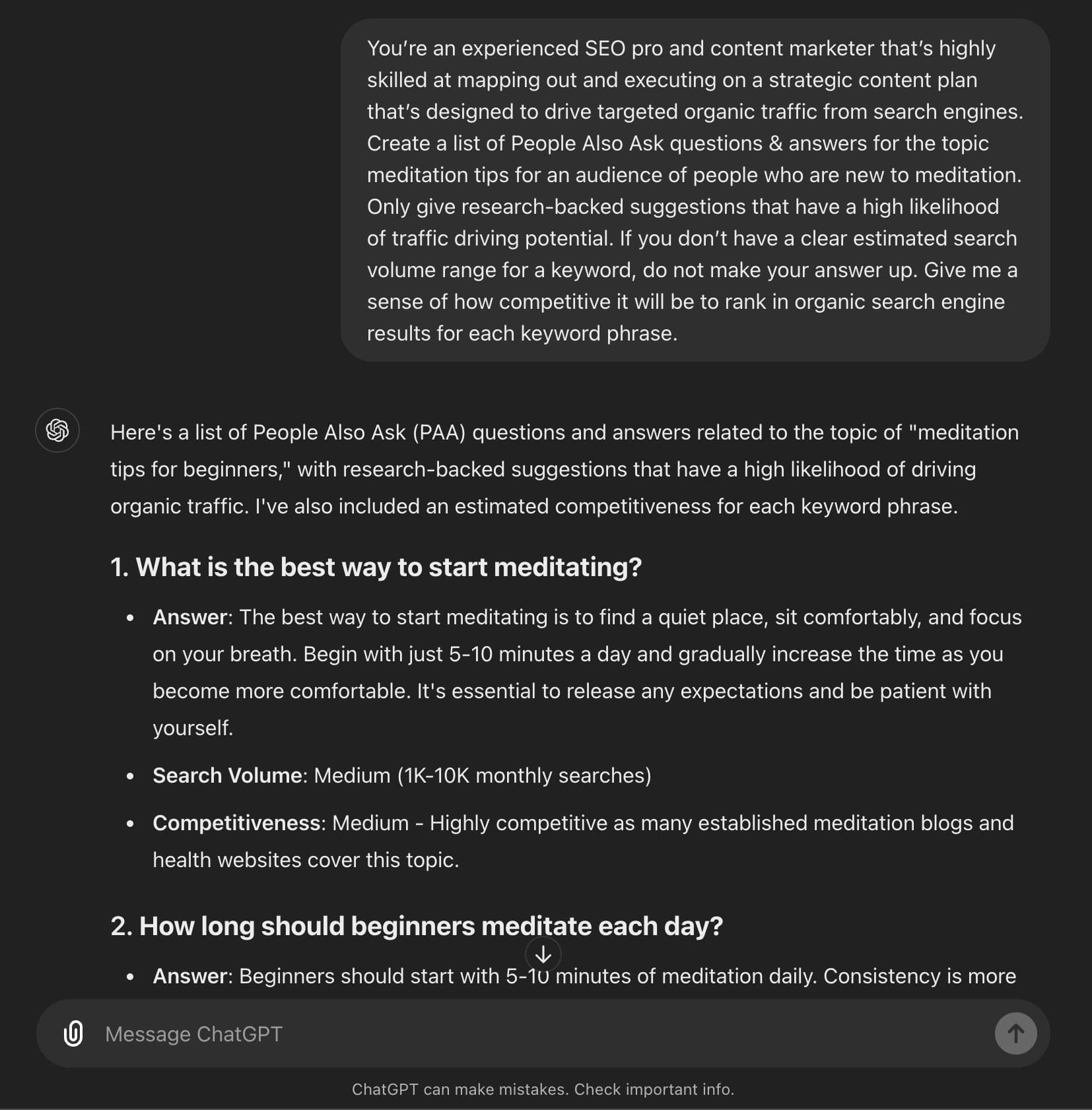
Try our People Also Ask tool for a lot more detailed, helpful insights on your PAA queries.
11. SEO-Optimize a Blog Post
Investing the time to properly optimize your blog posts before publishing them, whether they’re written with the help of AI or crafted entirely by you, is one of the best SEO best practices you can incorporate into your content workflow.
The tough thing for content creators, is that SEO is pretty much always changing, so optimizing your blog posts using ChatGPT can be a bit of a moving target. To guide you in your optimization process, here’s what’s thriving when it comes to thoughtfully (carefully) tuning your blog content to rank higher in Google search results:
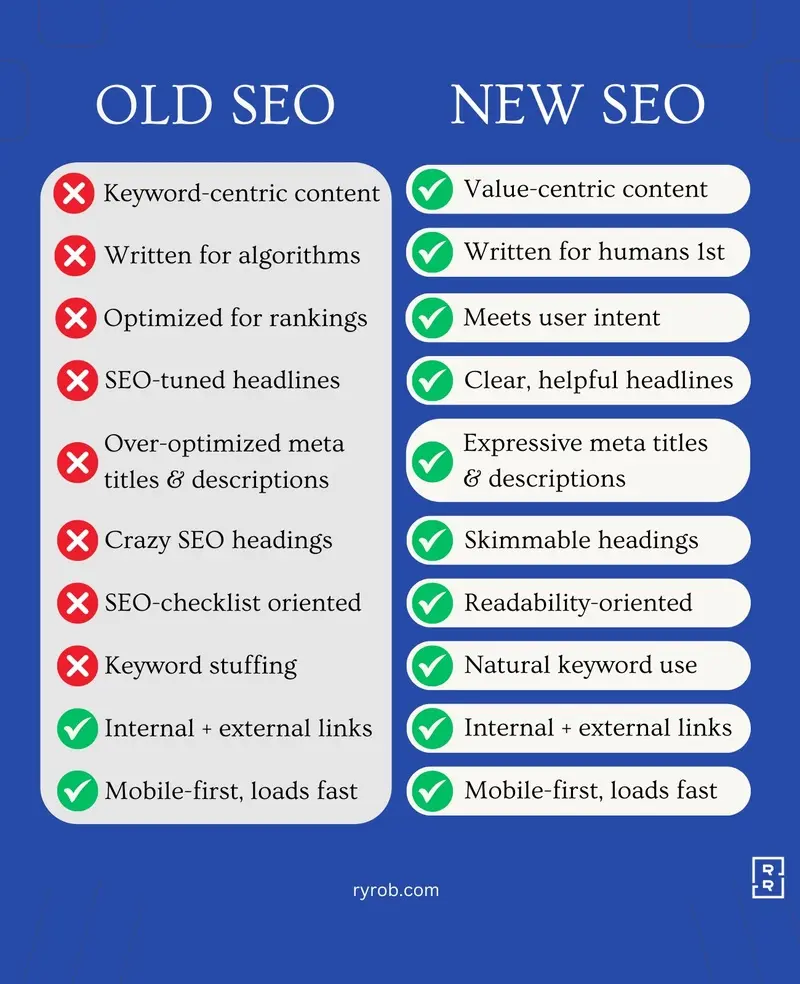
Now let’s say you’ve got an article that’s about ready to be published. Here’s my ChatGPT prompt for SEO optimizing your blog post, before taking it live:
And here’s this SEO prompt in action over inside ChatGPT:
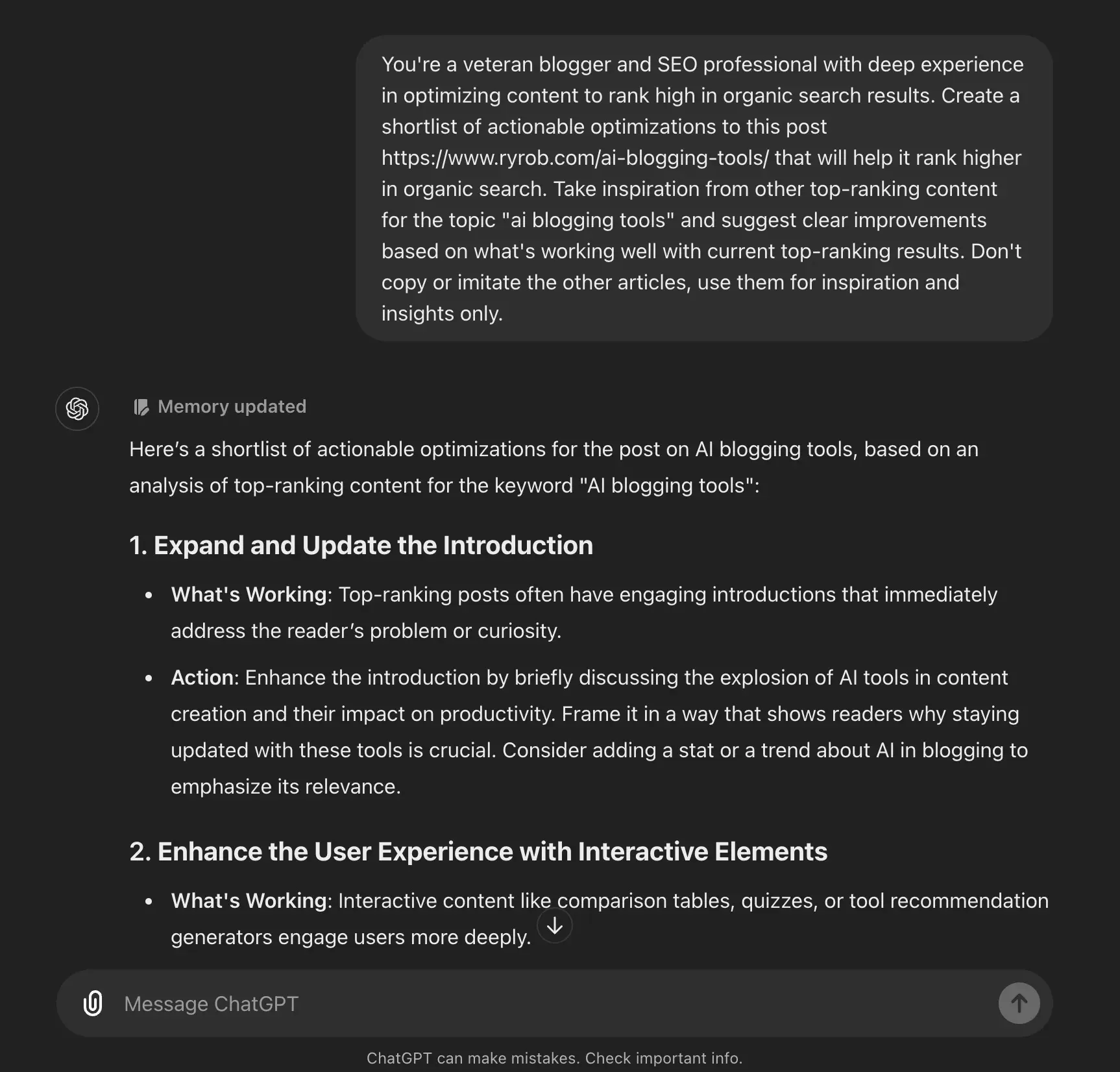
Try our Content Gap Analysis tool to get actionable optimization suggestions, based on insights from how your competitor’s content ranks higher.
12. Rewrite Content
Let’s start with the obvious—using AI to explicitly rewrite someone else’s content in just a few clicks, is not a use case I can get behind. No matter which way the world’s legal systems fall on AI constituting plagiarism or copyright infringement over the years to come, it’s always a no-no to directly copy someone else’s work.
So, when you use RightBlogger’s Rewriter Tool or ChatGPT to rewrite content, juts make sure it’s you’re own original work, and you’re doing this to speed up your production process. Here’s my ChatGPT prompt for rewriting content:
Here’s this prompt at work, inside ChatGPT:
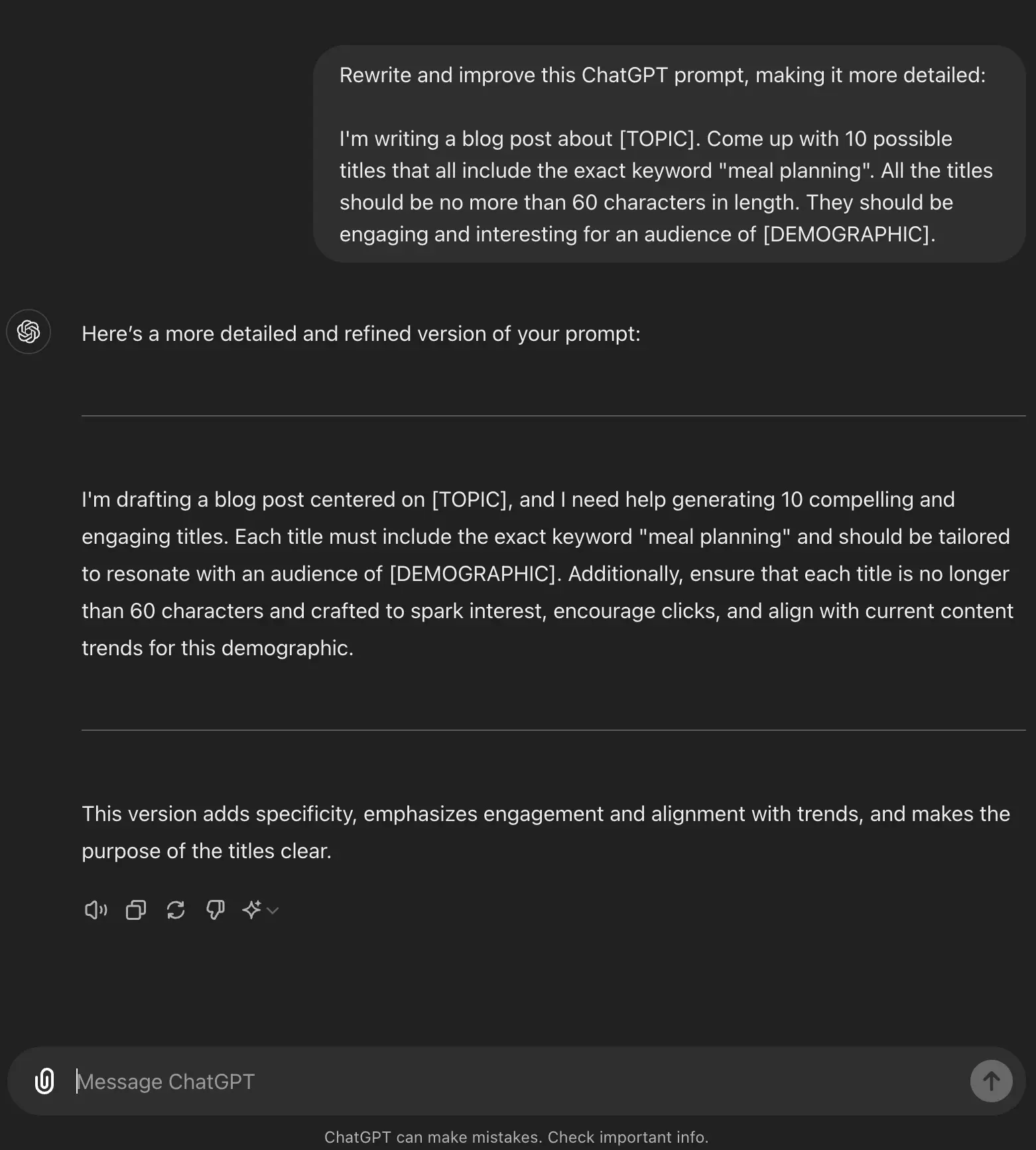
Be sure to try our Rewriter Tool, where you’ll be able to save all your creations directly inside your RightBlogger account, forever.
13. Summarize Content
Research can eat up lot of time. This ChatGPT writing prompt helps you get concise summaries of key points from complex sources, quickly.
By using ChatGPT to summarize books, articles, or studies, you can efficiently gather essential information without spending hours reading entire documents.

Our Summarizer tool makes this kind of work a breeze.
14. Write a Pitch Email (for Guest Posts)
Guest blogging has fantastic benefits for writers, including link building (boosting your SEO), brand building, awareness creation, lead generation, and more.
This is one of the most effective ways to get your name or product in front of a large audience and constantly attract more attention.
Pitching guest posts can seem very daunting, especially if you’re approaching a big-name blogger in your niche. Here’s a prompt to help you out:

Our Cold Email tool will get you started down the right path with your outreach.
ChatGPT Prompts for Marketers
Like it or not, just about the only way to get discovered or paid as a writer today, is to develop some marketing chops of your own—and find ways to have fun with spreading the word about your writing.

These are my best ChatGPT writing prompts with a marketing focus. I know you’ll find them useful.
15. LinkedIn Posts
Depending upon the niche you’re in and where your audience spends their time online, LinkedIn might just be the best social channel to go all in publishing daily content. updates that resonate with your professional audience and spark meaningful discussions.
Check out how ChatGPT returns some pretty solid starter content for LinkedIn posts, using this prompt formula:
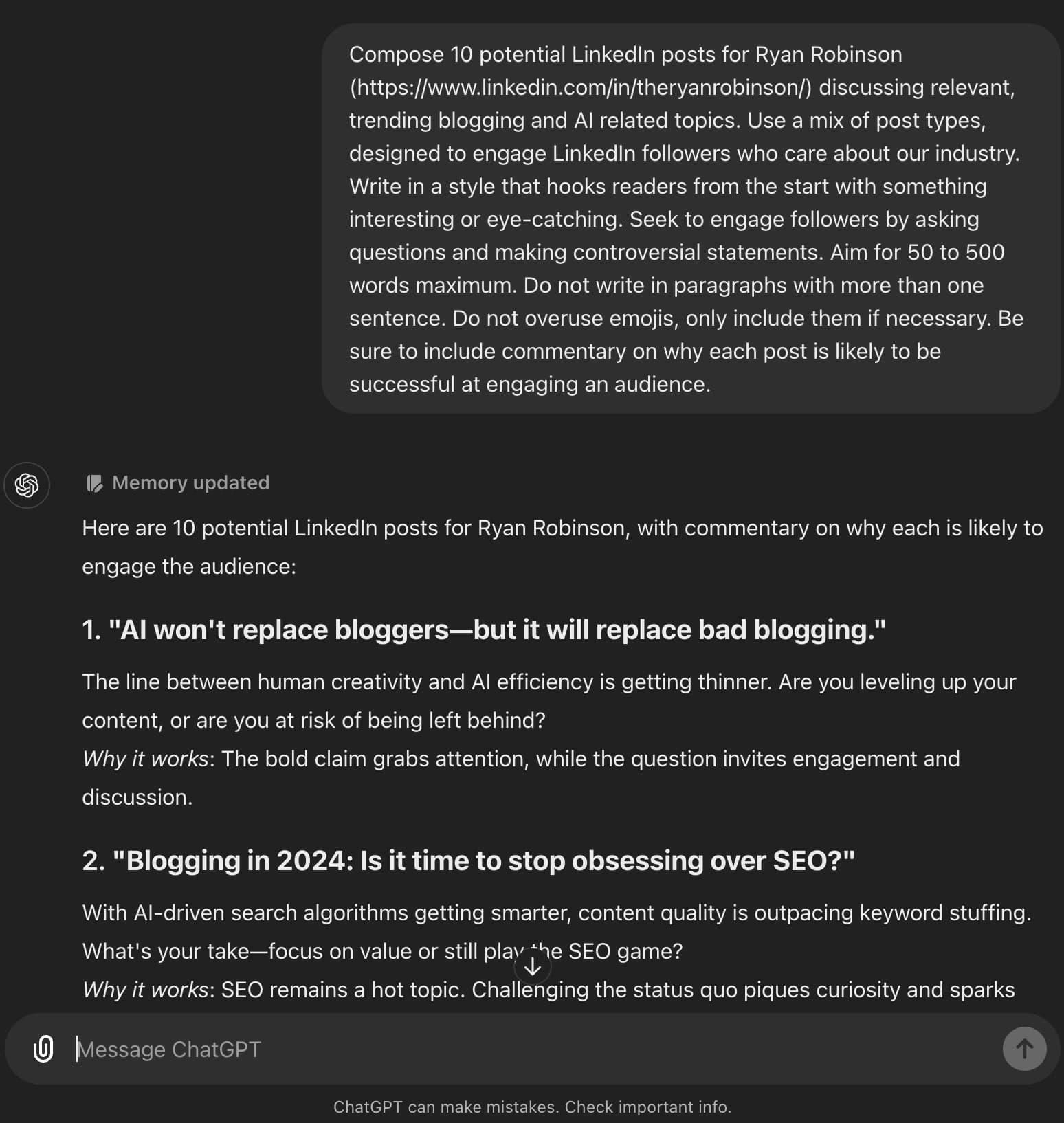
Check out the LinkedIn Post Generator inside RightBlogger.
16. Tweets (X Posts)
Quickly craft more engaging Twitter posts with the goal of sparking conversations and driving dialogue with the people in your niche.
It’s important to remember that with all social media channels, you’re not going to see results by just shouting about your brand into the void—take care to really interact with your people & have genuine conversations with them. This ChatGPT prompt for writing tweets (X posts) will get you started in the right direction.
Here’s this ChatGPT prompt for writing tweets in action:
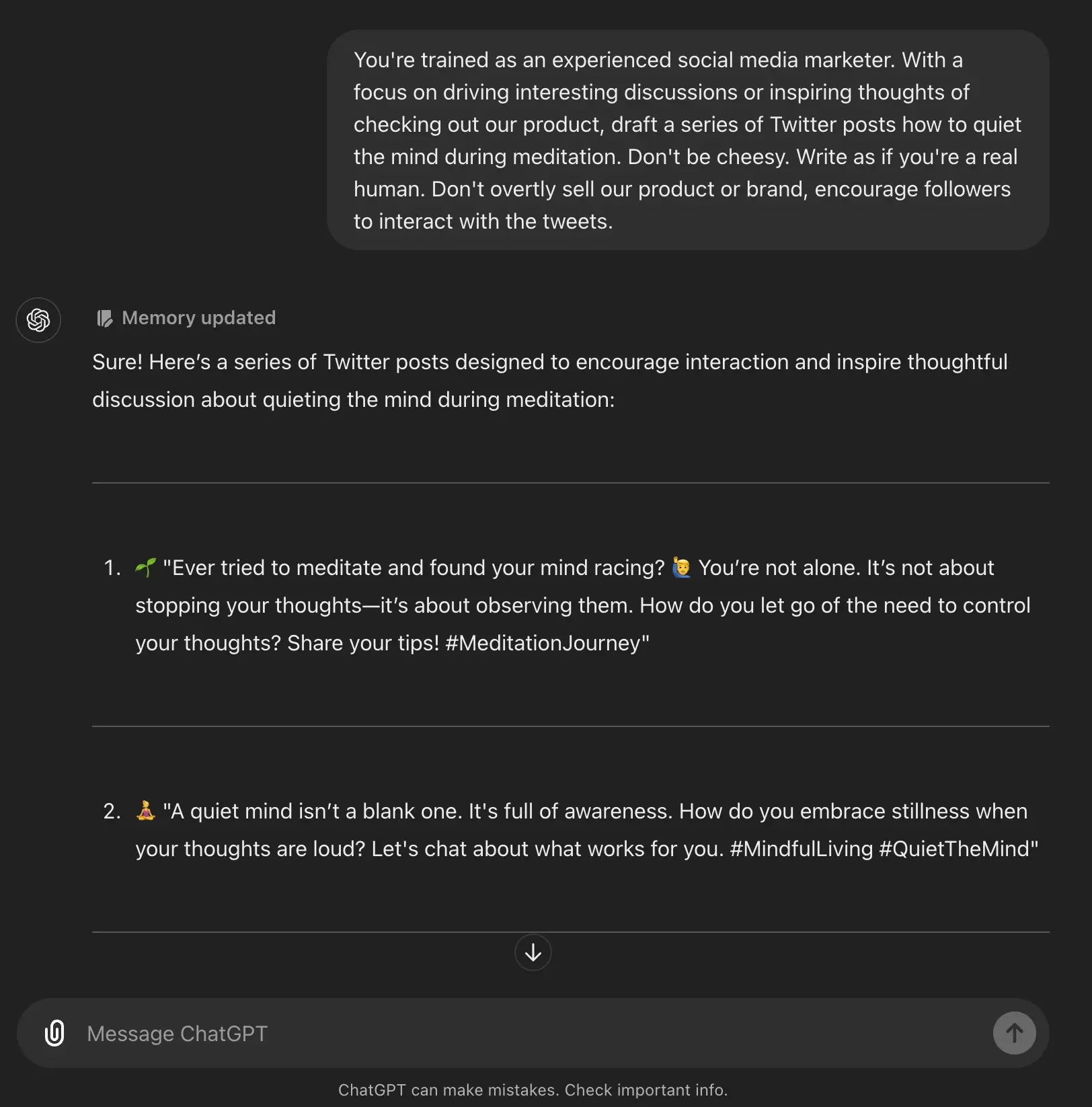
Check out the Tweet/X Post Idea Generator inside RightBlogger.
17. YouTube to Blog Post
Repurposing my YouTube videos into SEO-optimized blog posts is my new secret weapon for multiplying the effectiveness (and reach) of my content time investment. All thanks to AI, this process can now be done quickly, at-scale.
But, it’s a little trickier than you might think. ChatGPT can’t directly access video transcripts (the raw material you’ll need), from YouTube. This process is multi-step and a tad complicated for most. For that reason, we have an entire tool that turns your YouTube Videos into Blog Posts in just a few clicks, and it makes this a breeze:
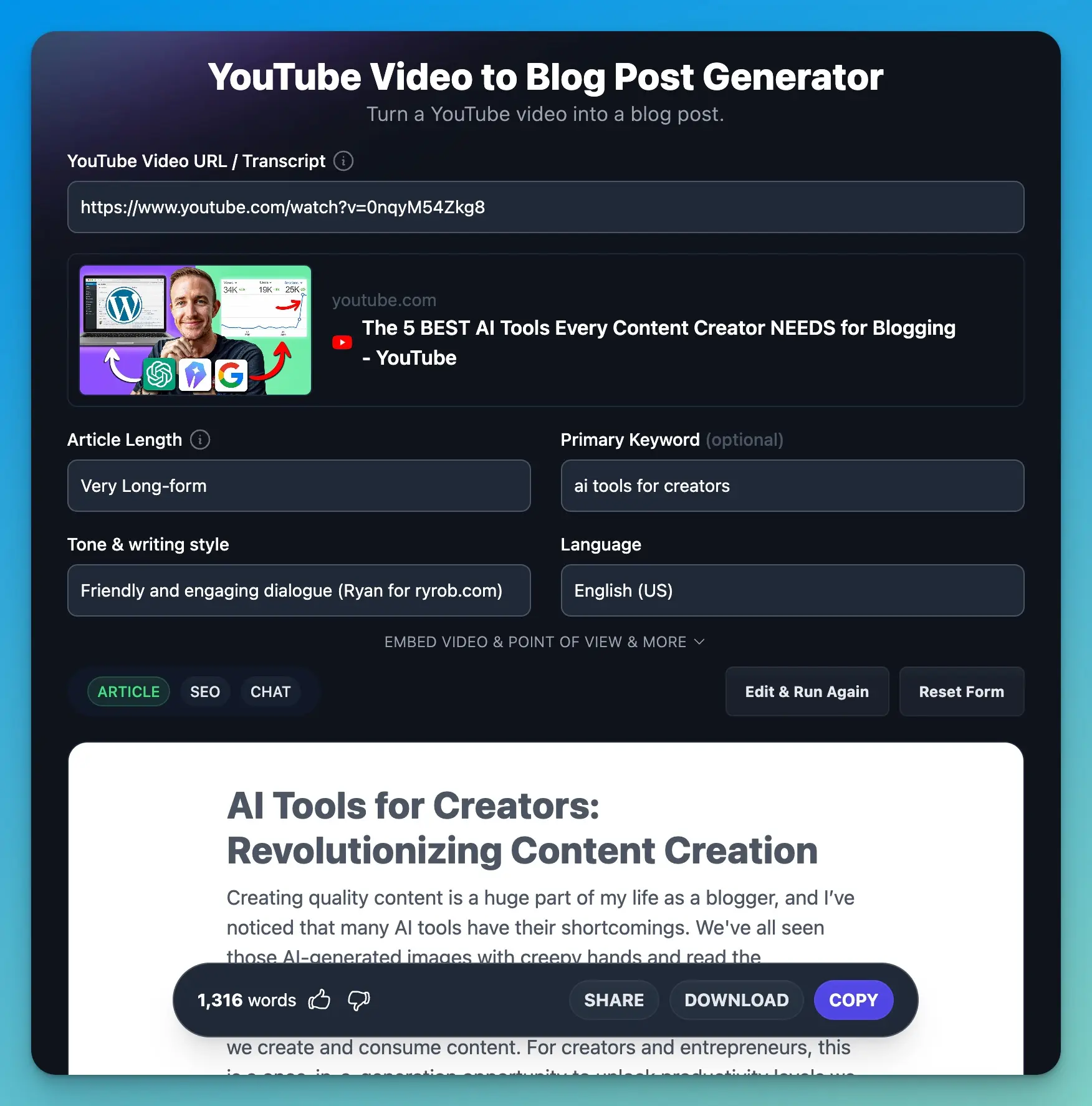
If you wanna go the ChatGPT route, you’ll first need to grab your YouTube video’s transcript. There are tons of tools online that can do this for you, including our very own YouTube Transcript Generator, which you can use in your free RightBlogger account:
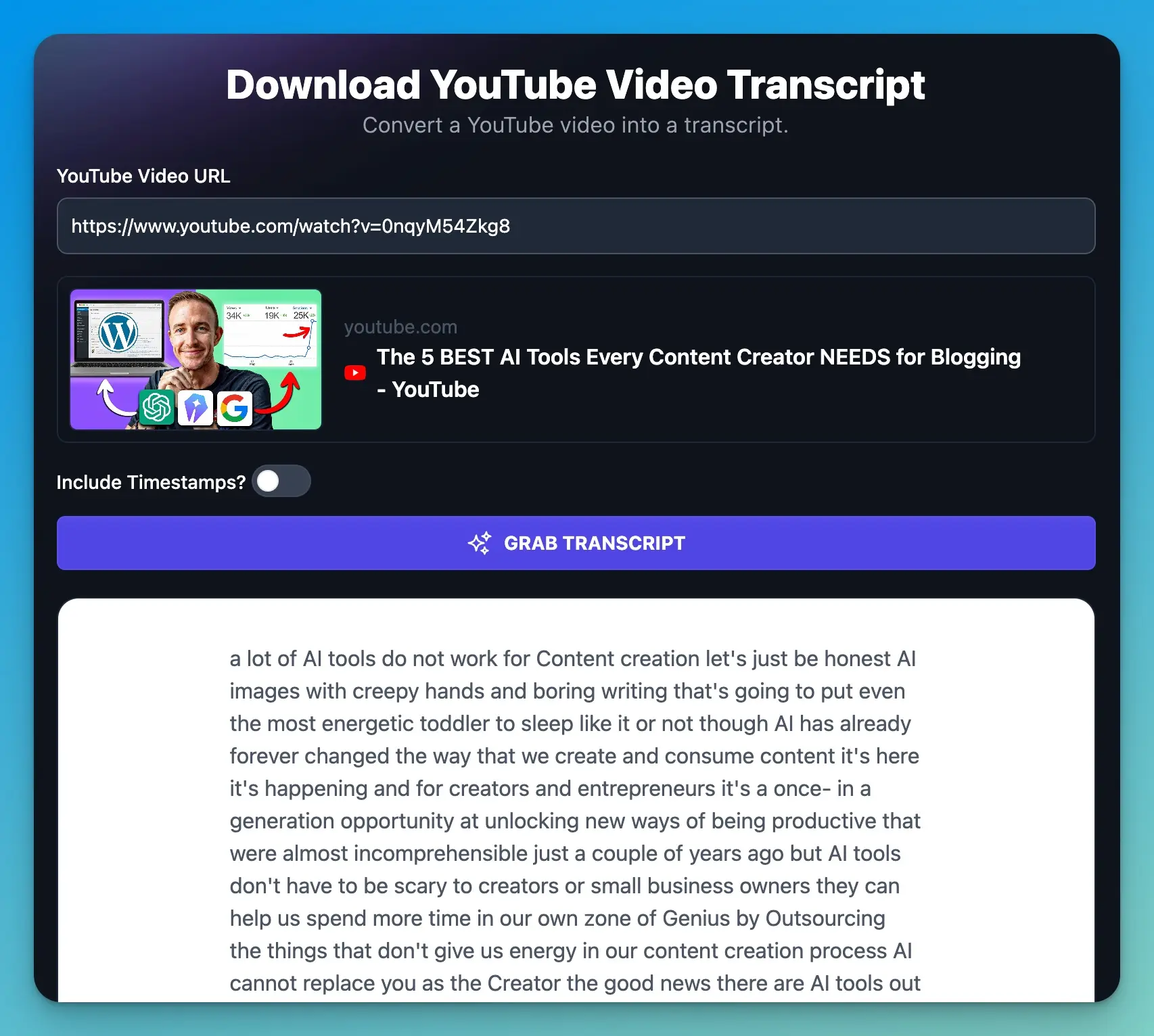
Once you have that transcript, you’ll be able to paste in either the raw written content, or download it in a file format that allows for easy sharing with ChatGPT.
Next, you’ll pop over and plug in this ChatGPT prompt for turning a YouTube video transcript into a blog post:
Here’s a peek at what this ChatGPT prompt can create:
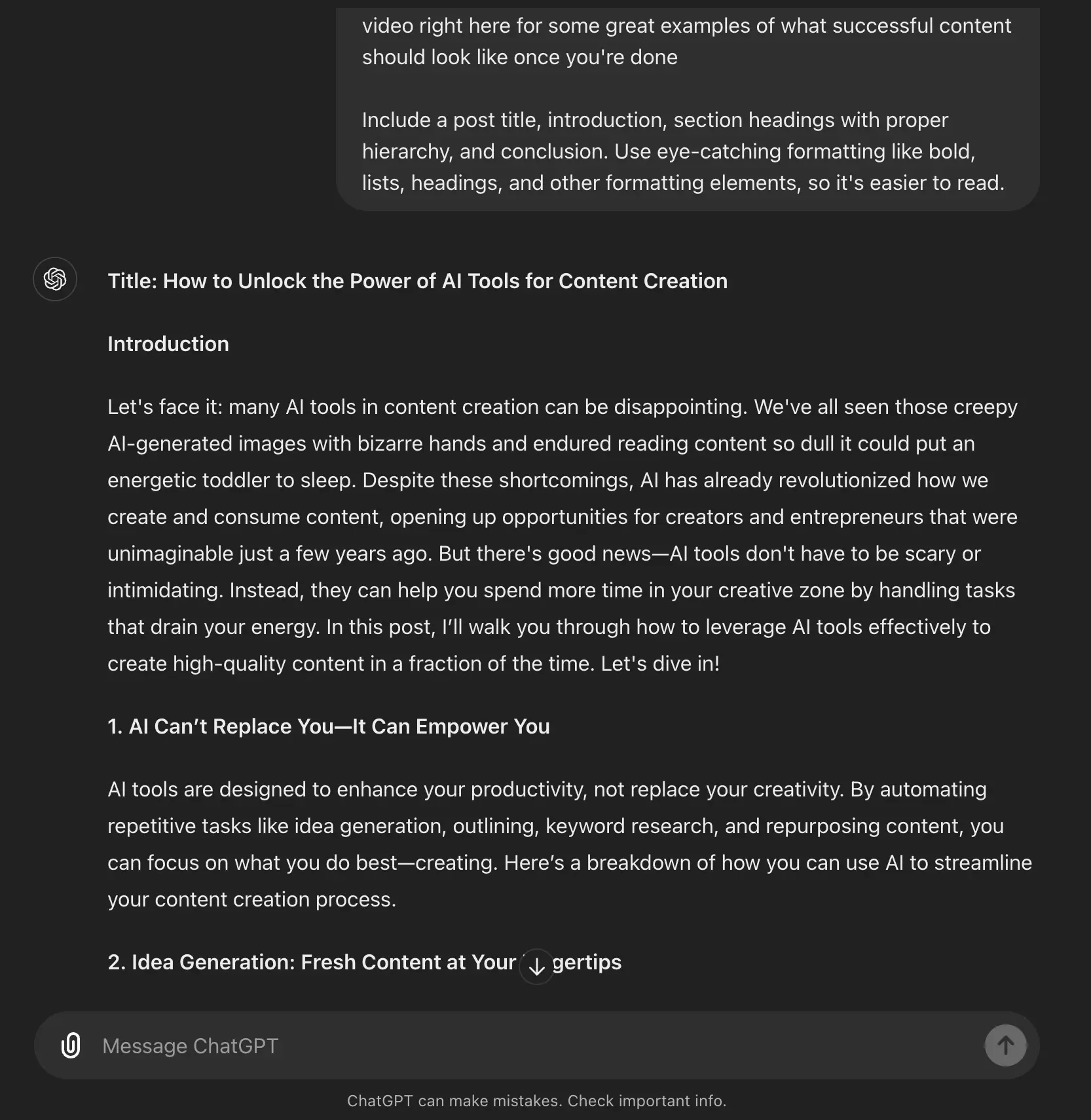
If you like this, you’re going to love our YouTube Video to Blog Post Generator.
18. Content Gap Analysis
One of the best use cases for AI today, is research and coming up with an analysis of the data it uncovers, based on your prompting.
I’ve found AI to be particularly useful at running a Content Gap Analysis, a task I’ve long done, to figure out exactly why a competitor’s article is ranking higher than mine. This arms me with the information I need to improve my article and increase my chances of outranking competitors.
Because this is such a powerful activity in terms of the immediate results you can experience from implementing data-informed changes, we’ve spent a lot of time perfecting our own Content Gap tool here inside RightBlogger (which you can use on our free plan):
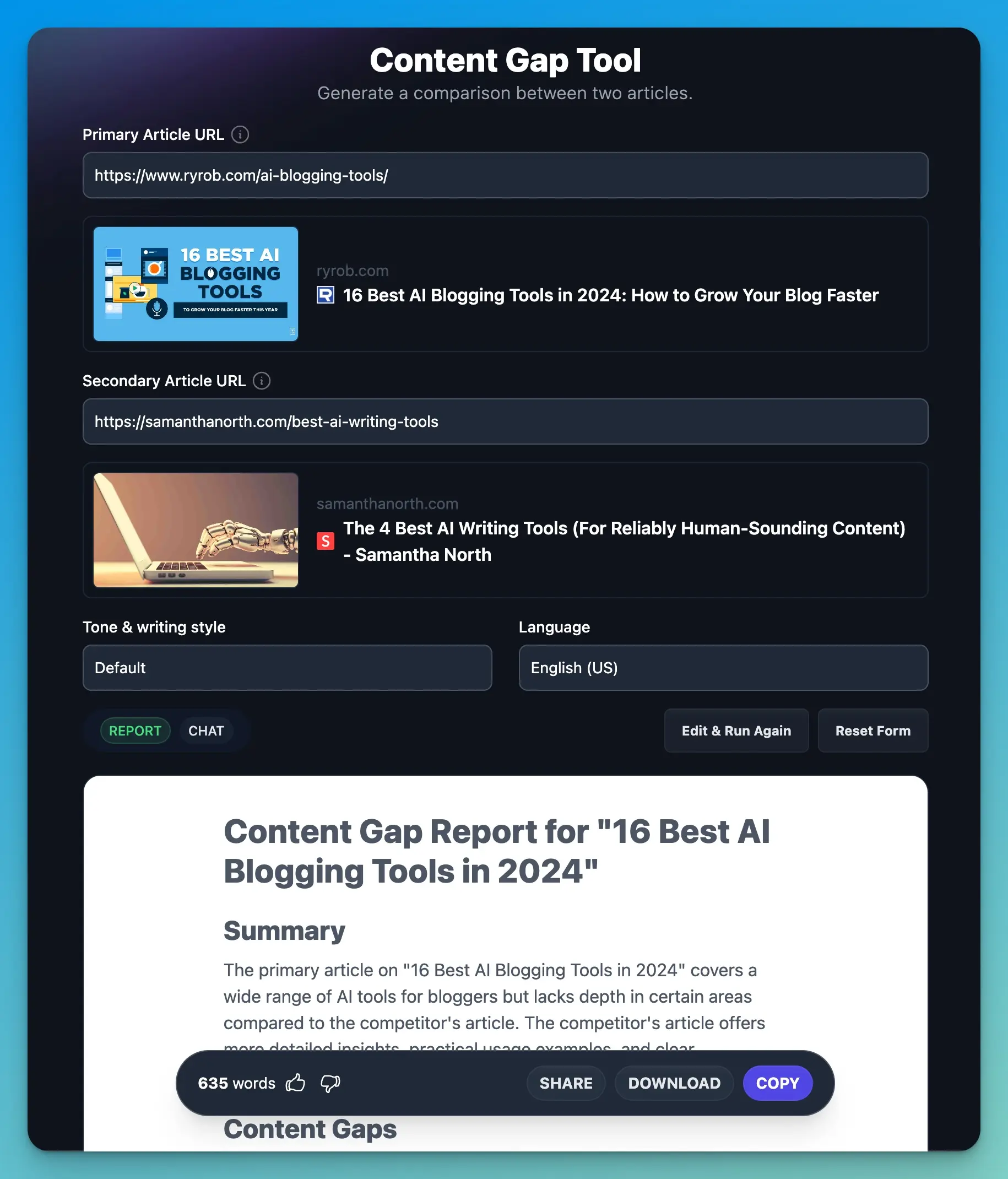
Pulling from multiple data & AI sources, our tool will give you a lot more actionable insights than your average ChatGPT output.
If you wanna use ChatGPT for this task, here’s my prompt you can use:
And here’s this ChatGPT prompt for content gap analysis, in action:
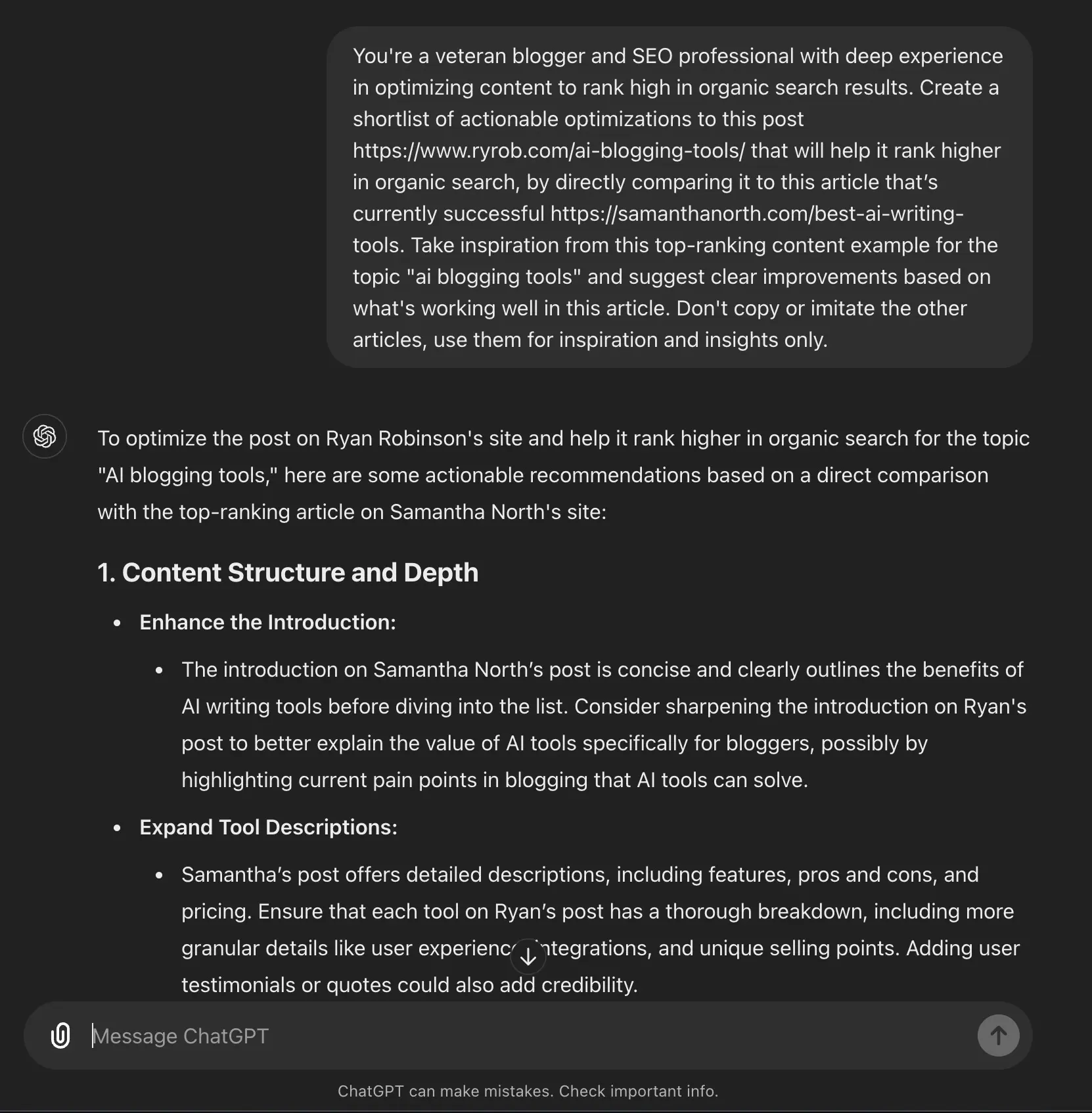
Take our Content Gap Analysis tool for a spin to get actionable insights on how to improve your content rankings, today.
ChatGPT Prompts for Copywriters
As a copywriter, you’re likely coming up with a lot of words on a day to day basis. AI tools like ChatGPT can be a massive help, letting you produce basic copy (like product descriptions or even promotional emails) almost instantly.
19. Write a Compelling Product Description
Even short product descriptions are challenging to write. They must describe the product, sell it, attract readers, and rank well on Google—often within a tight word count. And when you’ve got dozens or even hundreds of products, you could be looking at many days of work.
This prompt uses GPT-5.2’s ability to search the internet in real-time to craft high-quality product descriptions … without any work from you:
Here’s an example of what this ChatGPT writing prompt looks like for our product here at RightBlogger:

Tip: If you want a shorter product description, give ChatGPT a word count limit, or ask it to “shorten that product description, keeping it engaging and compelling in under 50 words”:

We built a nifty Product Description Generator for just such occasions.
20. Write High-Impact Ad Copy
Creating ad copy can take ages… even if you’re only writing a couple of sentences. (In fact, it’s often harder to write short ad copy, as you need to pack so much in.)
ChatGPT is great for coming up with ad copy and variations fast. Here’s a prompt you can use to get fantastic results:

Be sure to take our Ad Copy tool for a spin inside RightBlogger.
21. Create FAQ Content
FAQ content is some of the best SEO fuel you can create (especially for AI search). Use this ChatGPT prompt to quickly research and write a comprehensive FAQ section to address common customer questions, based on the topic at hand:
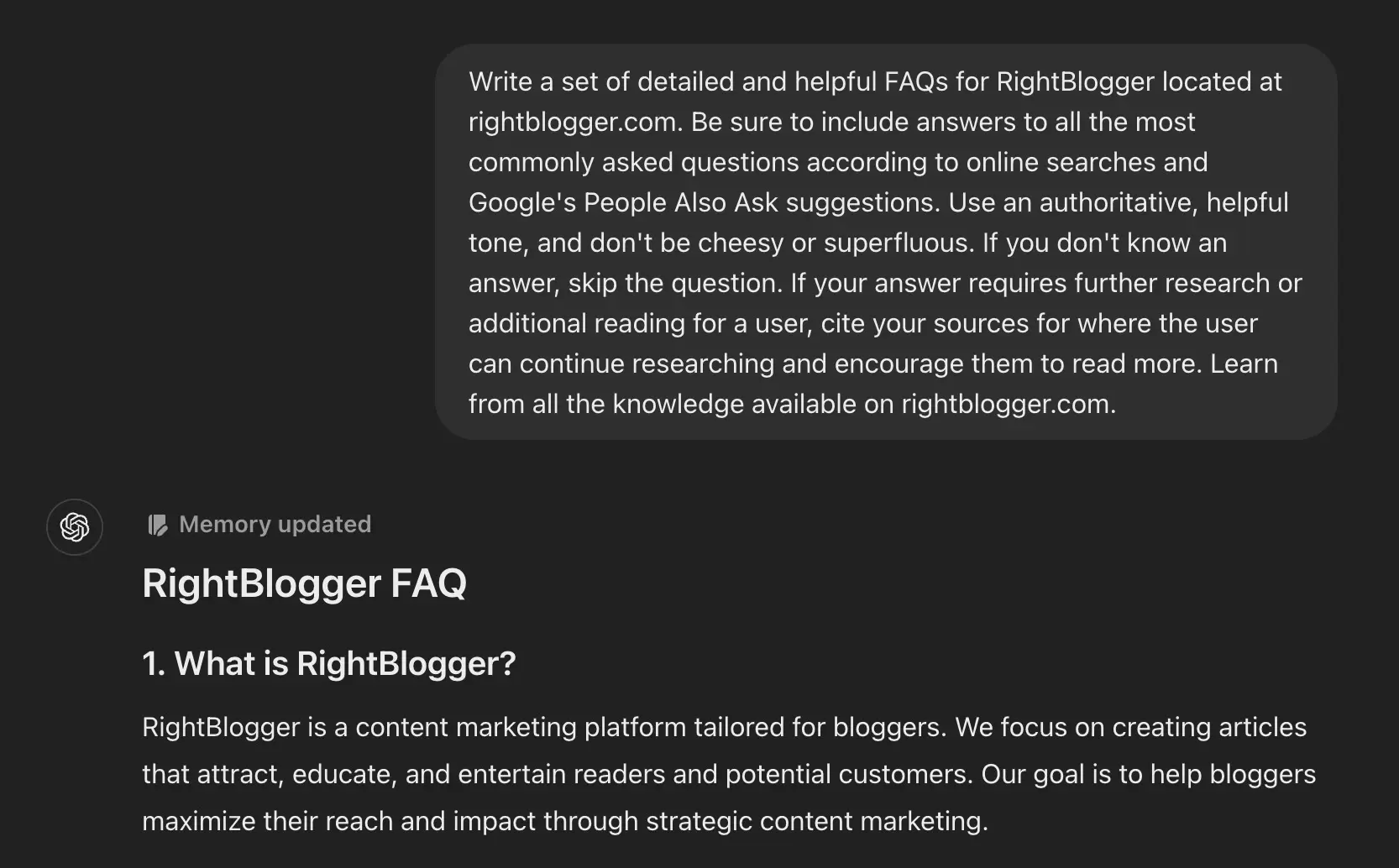
Try the FAQ tool inside RightBlogger.
22. Grammar and Spellcheck
There’s nothing worse than publishing a blog post you’re really proud of, only to get a comment or an email from a reader that points out a glaring typo or grammatical error that evaded you during your final review.
Tools like Grammarly can help a lot in this regard, but if you don’t want just another subscription to pay for each month, you can use ChatGPT for this purpose. Here’s my ChatGPT prompt for making grammar and spelling fixes:
Here’s this ChatGPT grammar and spellcheck prompt in action:
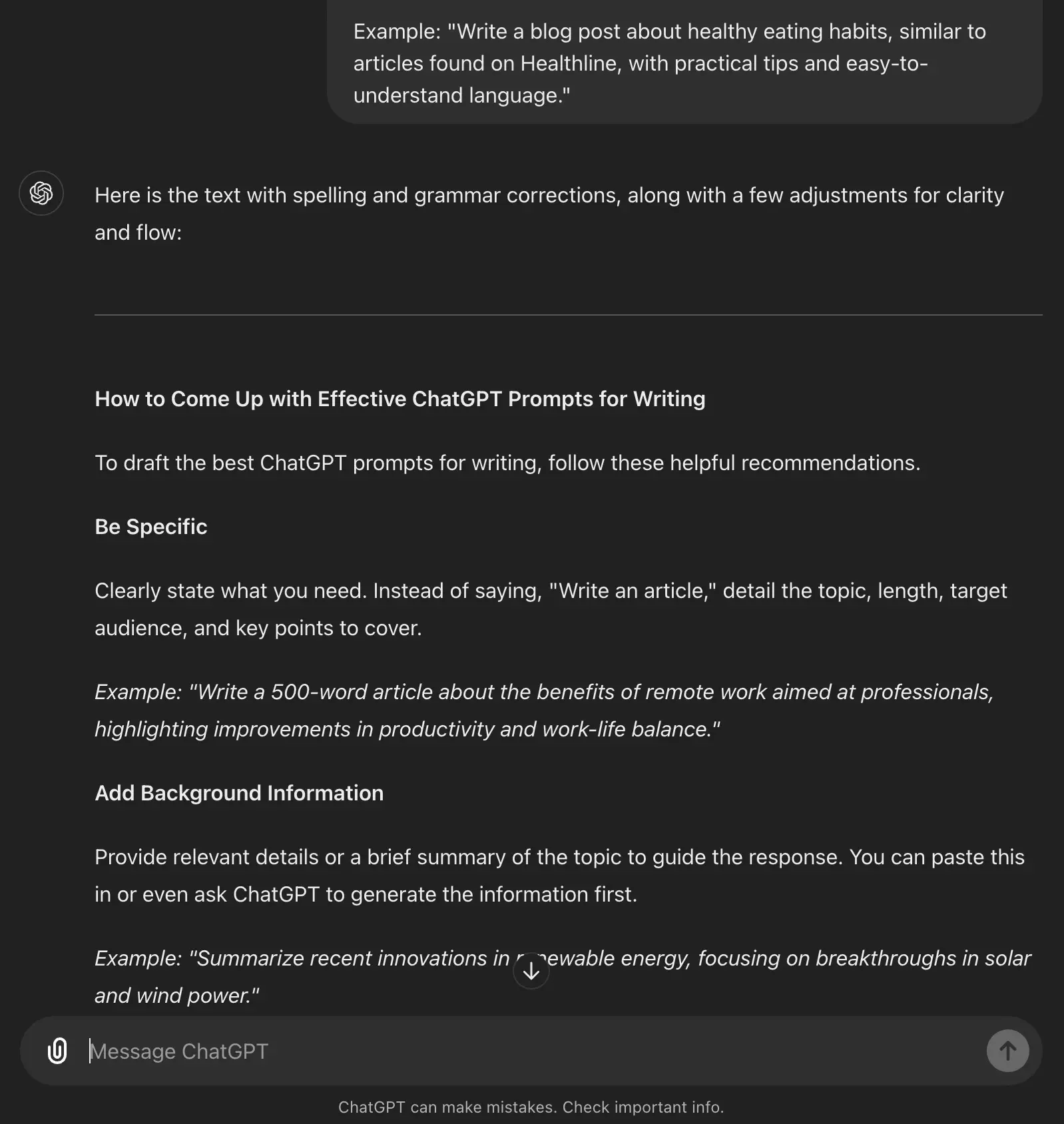
You can do this inside RightBlogger using our Grammar & Spelling Fixer tool.
ChatGPT Prompts for Fiction Writers
Are you working on a short story or novel? While you probably want most of the creative input to be your own—after all, that’s part of the fun of it—ChatGPT can help you when you’re struggling with writers’ block or just need a little extra inspiration.
23. Book Titles
Landing on the right book title that really feels like the one, can take forever. Sometimes you’ll fall in love with one potential title, only to lose interest as you keep writing and the scope of your book continues to shift.
I like using AI for tasks like generating titles, because it also gives me fun ideas for how I could frame the core principle of the work I’m writing. Here’s my ChatGPT prompt for writing book titles that’ll resonate with readers:
And here’s this prompt at work, over inside ChatGPT:
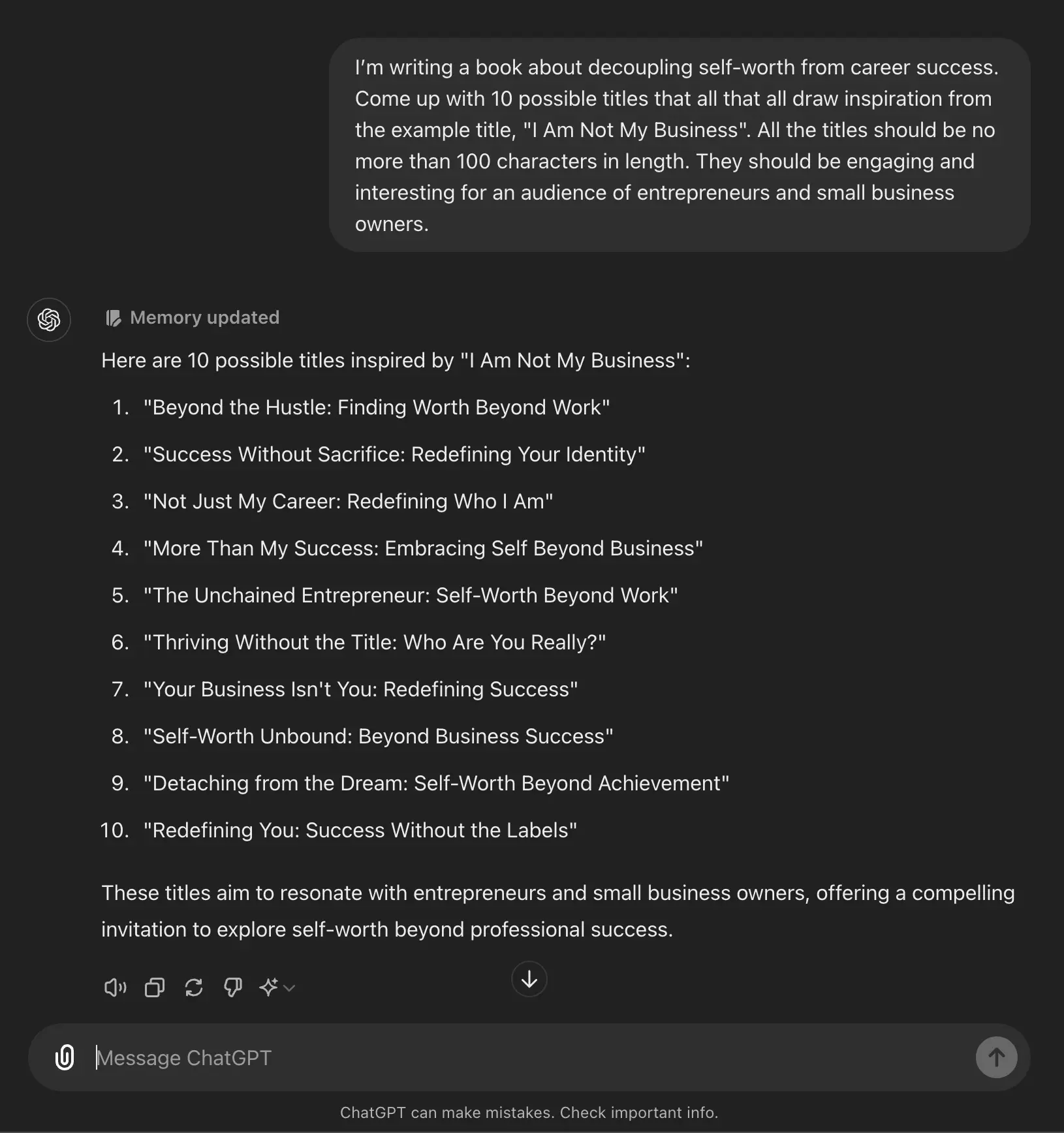
24. Create a Detailed Novel Outline
Writing a novel can be hugely daunting. How should the story begin? What key scenes need to happen along the way? Where does it all end up?
ChatGPT can’t replace your own creative imagination… but it can come up with a novel outline that you could use as a template or a starting point, or to give you additional ideas to incorporate into your existing outline.
Here’s a ChatGPT writing prompt to try for getting a quick outline in place:

Continuing on, here are all the chapters ChatGPT came up with, including brief summaries that’ll set you down the right path—or give you some good fuel to edit and make more you.

Take our Outline Generator for a spin inside RightBlogger today.
25. Character Profiles
Creating well-rounded characters is essential: readers may enjoy the twists and turns of your plot, but it’s your character’s they’ll fall in love with.
This prompt helps you develop a detailed character profile for your protagonist, including their background, personality traits, and motivations.
Here’s how this ChatGPT prompt for writing could look, in practice:

Tip: You can easily modify this prompt if you already have some ideas about your protagonist. For instance, you could ask for a “female protagonist” or “60-something protagonist” or “retired cop protagonist”… whatever fits your story.
Bonus: How to Come up with Effective ChatGPT Prompts for Writing

To draft the best ChatGPT prompts for writing, follow these helpful recommendations.
Be Specific
Clearly state what you need. Instead of saying, “Write an article,” detail the topic, length, target audience, and key points to cover.
Example: “Write a 500-word article about the benefits of remote work aimed at professionals, highlighting improvements in productivity and work-life balance.”
Add Background Information
Provide relevant details or a brief summary of the topic to guide the response. You can paste this in or even ask ChatGPT to come up with the information first.
Example: “Summarize recent innovations in renewable energy, with a focus on breakthroughs in solar and wind power.”
Specify Tone and Style
Clearly indicate the tone and style you want. That might be professional, casual, persuasive, or narrative.
Example: “Compose a professional letter to a government official, advocating for reforms in environmental policies.”
Tip: RightBlogger has this already baked in for you! Pick from a dropdown list or, even better, use MyTone to create a custom tone that’s perfectly tailored for your voice or brand.
Ask for Structure
Specify the structure you want for your piece, asking for specific sections like an introduction, body, conclusion, or bullet points.
Example: “Outline a research paper on the impact of social media on mental health, including sections for an introduction, literature review, methodology, results, and conclusion.”
Use Examples and Analogies
Provide examples of similar material or analogies to help ChatGPT understand your expectations.
Example: “Write a blog post about healthy eating habits, similar to articles found on Healthline, with practical tips and easy-to-understand language.”
RightBlogger: A Better Alternative to ChatGPT Prompts for Writing
RightBlogger is a fantastic alternative to ChatGPT that offers over 75+ tools designed to elevate your writing and blogging. These tools use incredibly advanced prompts and techniques to give you the best output every time.
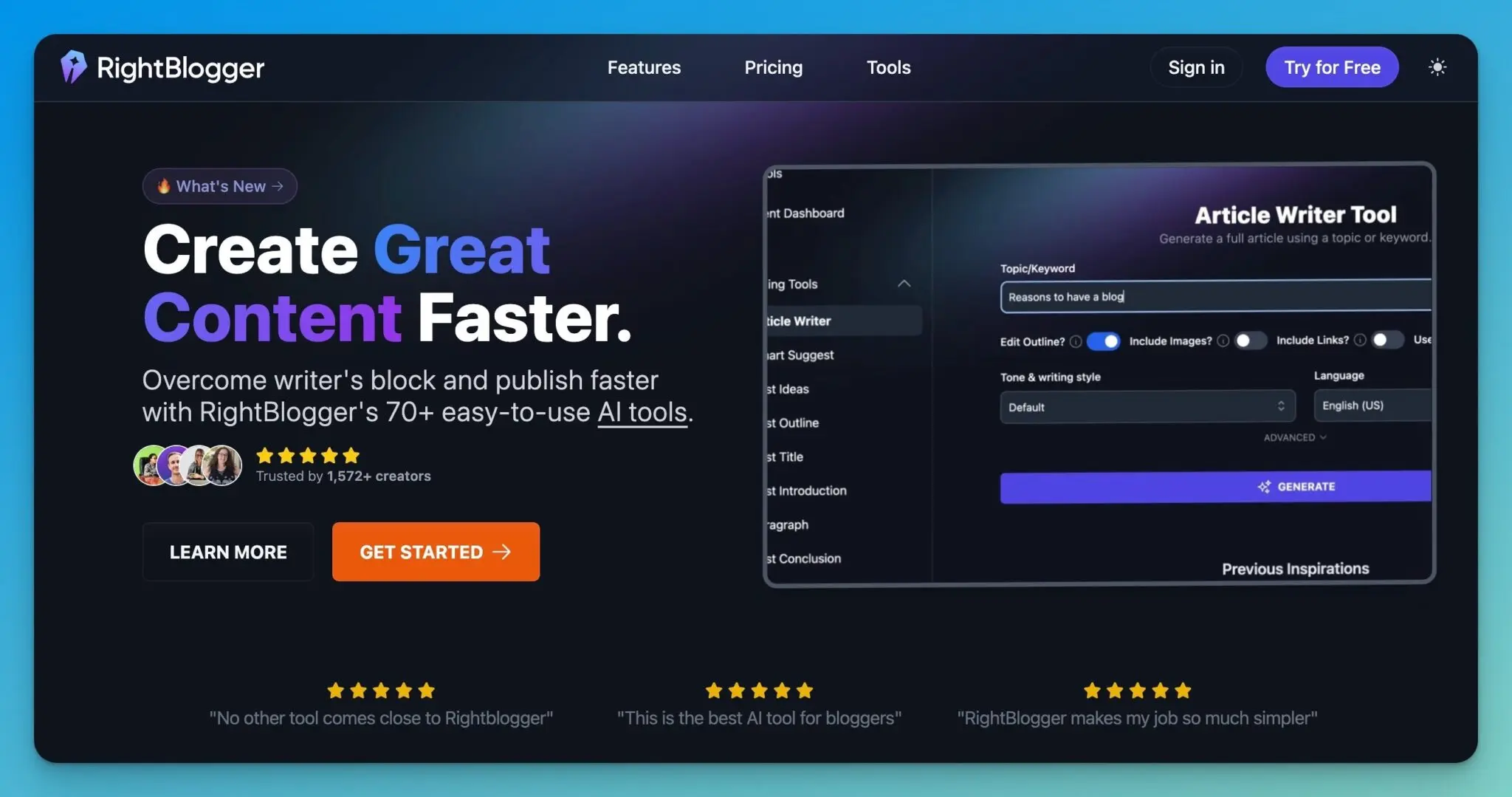
You can sign up for RightBlogger now to try out all of our tools completely free. Here are some of the ones you’ll want to check out right away:
Autoblog
Creating great content is one thing. Publishing it consistently is another.
With RightBlogger Autoblogging, you can plan, write, SEO-optimize, and publish content on a schedule, all in one place. You choose the topics and cadence, and RightBlogger handles the heavy lifting behind the scenes.
This makes it much easier to stay consistent, build topical authority, and grow traffic over time without sitting down to write every post by hand.
If you want a simpler way to turn ideas into published content, Autoblogging is built for exactly that.
AI Article Writer
This powerful tool allows you to generate comprehensive articles or blog posts quickly, with subsections, images, links, and even the latest stats or information from the web.
While we always recommend having a human edit and fact-check your content before publication, the article writer will produce a high-quality piece that’s 95% of the way there already.
Keyword Research
RightBlogger’s integrated keyword research tool helps you identify the most effective keywords to boost your SEO (search engine optimization)
By analyzing search trends and competition, this tool makes it easy to find the best queries to base your content around if you want maximum search traffic.
Chat Tool
The Chat Tool in RightBlogger allows you to interact with AI in real time, so you can ask for instant assistance with and feedback on your content.
This feature lets you do anything you like: refine your ideas, improve your drafts, and improve your content by offering creative suggestions and enhancements on the spot. It’s like having a writing coach or editor on hand 24/7.

RightBlogger provides a tailored content creation experience that goes way beyond basic prompts, making it an invaluable tool for writers looking to improve their content strategy and write high-quality content, fast.
ChatGPT prompts like the ones can seem like the obvious place to begin, when you’re trying out AI… but give RightBlogger a whirl too. You’ll find it’s so much easier to get the kind of output you want with our pre-built tools. (And we’re adding new ones all the time!)
Create Automated SEO Blog Posts in Minutes with RightBlogger

Join 47,587+ bloggers, creators, marketers, writers, & business owners in using RightBlogger’s powerful autoblogging tools. You’ll unlock 80+ blogging, SEO, and marketing AI tools to create content faster & more effectively today. Plus, you’ll access our library of courses, a private community, Tool Studio’s AI lead magnet builder, and more.
How do I write a ChatGPT writing prompt that does not sound generic?
Start by giving ChatGPT clear, specific instructions about the topic, audience, and the exact output you want. Vague prompts usually lead to vague writing.
Include details like your goal (teach, sell, entertain), your reader (beginner, busy parent, SaaS founder), and your must-cover points. Ask for a structure too, like an intro, 5 headings, and a conclusion.
If you want better results fast, learn the basics of prompt engineering so you know what details matter most and what to leave out.
What should I include when asking ChatGPT to write a blog post outline or sections?
Tell it the exact angle of your post, not just the broad topic. For example, “time management for new managers using simple daily habits” is better than “time management.”
Then add: your audience, your point of view, the main keyword, and any examples you want included. You will get a cleaner outline if you ask for heading levels (H2s and H3s) and a short note under each heading.
If you want a faster workflow, use a tool built for this, like RightBlogger’s blog outlines generator, then customize the outline with your real experience.
Can ChatGPT help with SEO and keyword research for writing?
Yes, but use it for direction, not as your only source. ChatGPT can help you brainstorm keyword ideas, related questions, and what sections readers expect to see.
Search volume and ranking difficulty are tricky because they change and they depend on data sources. If the tool does not know, it should say so instead of guessing.
After you draft, run an SEO check so you know what to improve before you publish. RightBlogger’s SEO Reports can help you spot missing topics, weak headings, and other quick wins.
What is the best way to edit AI-written content so it sounds human?
Edit for accuracy and voice first. AI is good at drafts, but you should add your own examples, opinions, and real steps so the post feels original.
Next, do a “clarity pass.” Cut fluff, shorten long sentences, and replace vague lines with specific actions a reader can take.
Finally, fact-check names, stats, and claims. If you cannot confirm something, remove it or rewrite it as an opinion, not a fact.
How can RightBlogger help me use these writing prompts faster?
RightBlogger helps by turning prompt-based work into repeatable tools and workflows. Instead of rewriting prompts every time, you can generate solid drafts and then refine them with your own edits.
If your goal is long-form content, the RightBlogger AI Article Writer can help you create a strong first draft with a clearer structure and SEO focus.
You still stay in control. The best results come from adding your point of view, tightening the language, and publishing consistently.
Article by Ryan Robinson
RightBlogger Co-Founder, Ryan Robinson is a blogger who teaches 500,000 monthly readers at ryrob.com. He is a recovering side project addict.
New:Autoblogging + Scheduling
Automated SEO Blog Posts That Work
Try RightBlogger for free, we know you'll love it.
- Automated Content
- Blog Posts in One Click
- Unlimited Usage





Leave a comment
You must be logged in to comment.
Loading comments...